
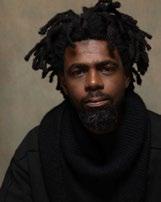
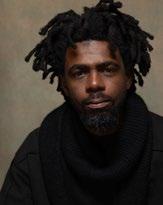



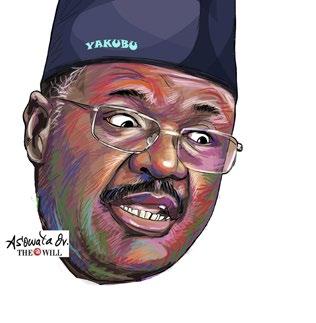
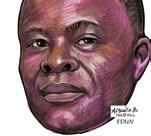
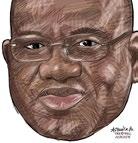

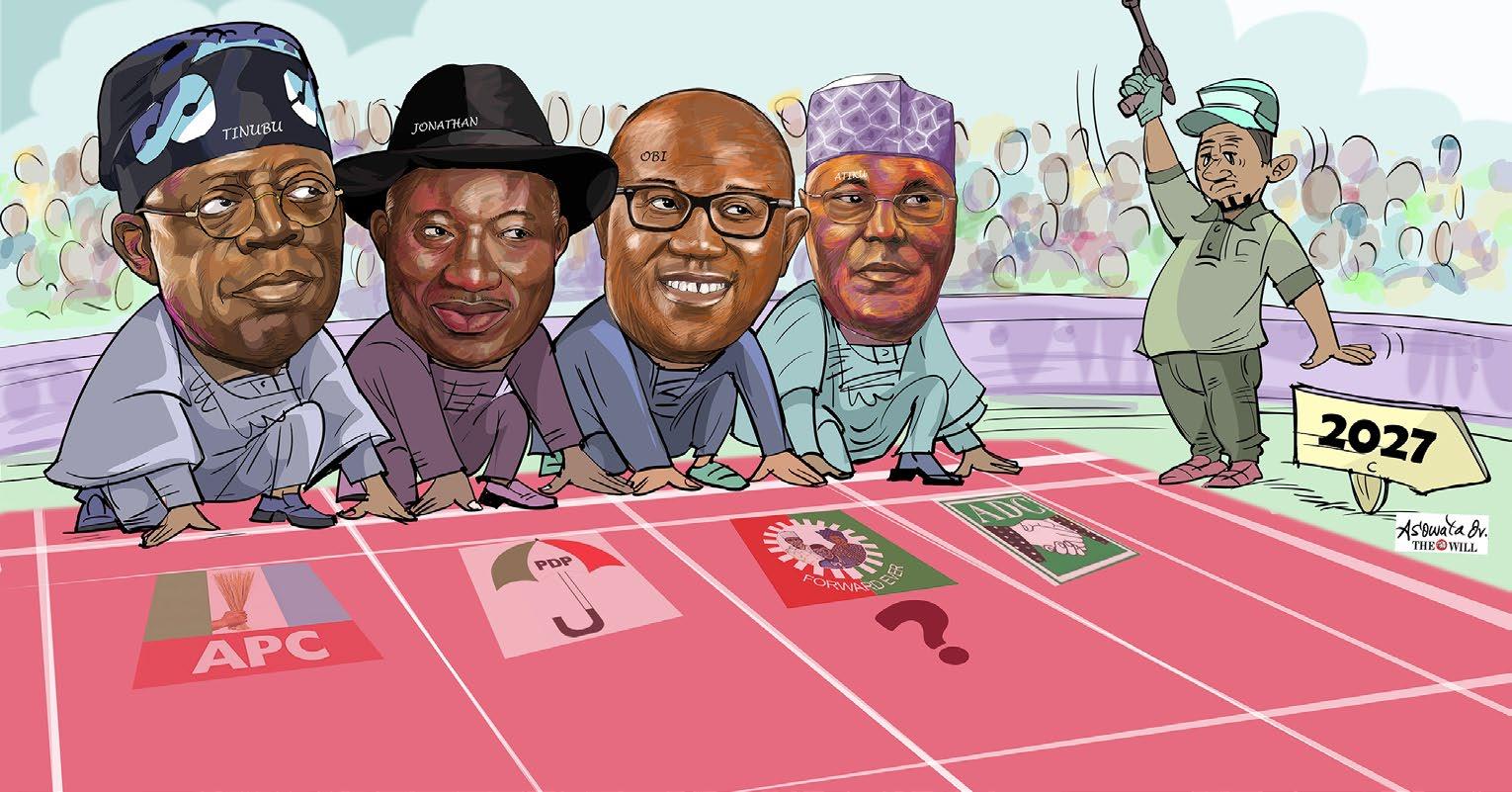


















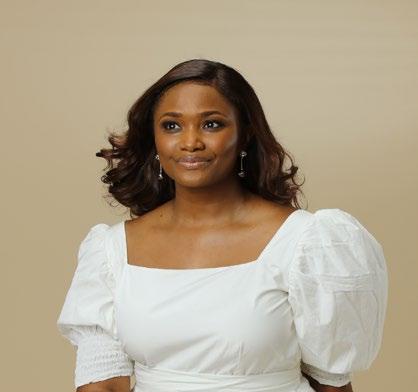




When I learned that Joel Kachi Benson won the 2025 Emmy for Outstanding Arts and Culture Documentary, it made me very proud to be Nigerian. It got me wondering what inspires his stories. Benson used to produce various kinds of content, including weddings and music videos, until one day he got an opportunity to create a series of short documentaries featuring inspiring people. The stories were those of grass-to-grace, and he found them very inspiring, which marked the beginning of his journey into factual filmmaking. You might wonder what impact winning an Emmy award has on his work. Quite simply put, it opens doors to certain conversations with certain people.
There’s a lot more to Benson’s story, but I’ll let you read all about him on pages 8 to 10 of this issue.
Denim skirts have been around for decades, and they never go out of style. Regardless of the look and feel you are going for, the versatility of a denim skirt makes it work for almost any occasion. Our fashion pages showcase various styling ideas for a denim skirt, helping you look effortlessly chic every time. See pages 4 and 5 for this.
In the world of beauty, when it comes to skincare, some ingredients do all the work; squalane is one of them. This miracle ingredient is gentle on the skin and locks in moisture, leaving the skin soft and smooth. Read more about squalane on page 12.
This week, our movie choice for review is Fantastic Four: First Steps. From the review, it seems like an interesting one, so I’m looking forward to seeing it. Are you?
Until next week, enjoy your read.







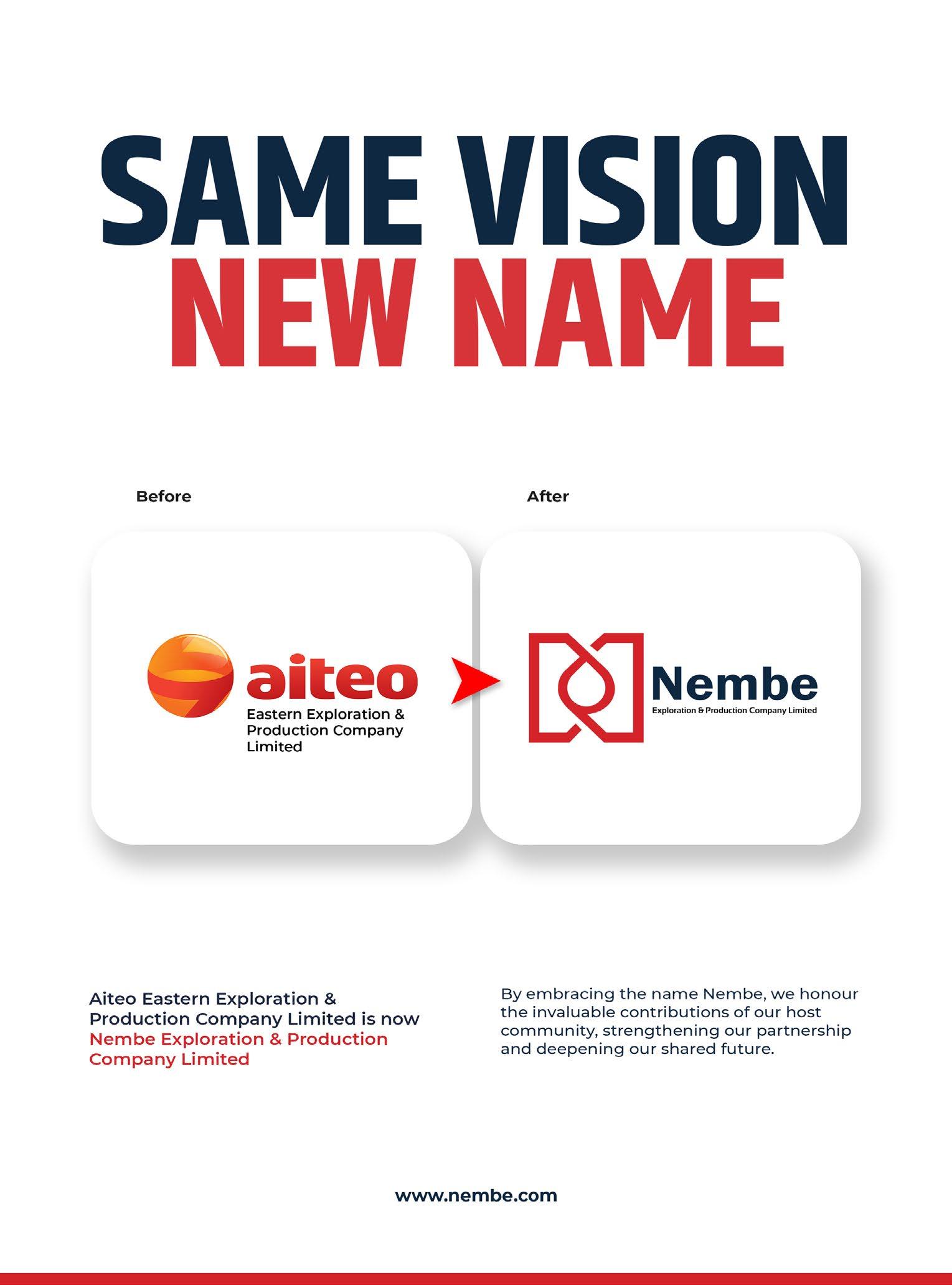
SUNDAY, AUGUST 10, 2025


SUNDAY, AUGUST 10, 2025
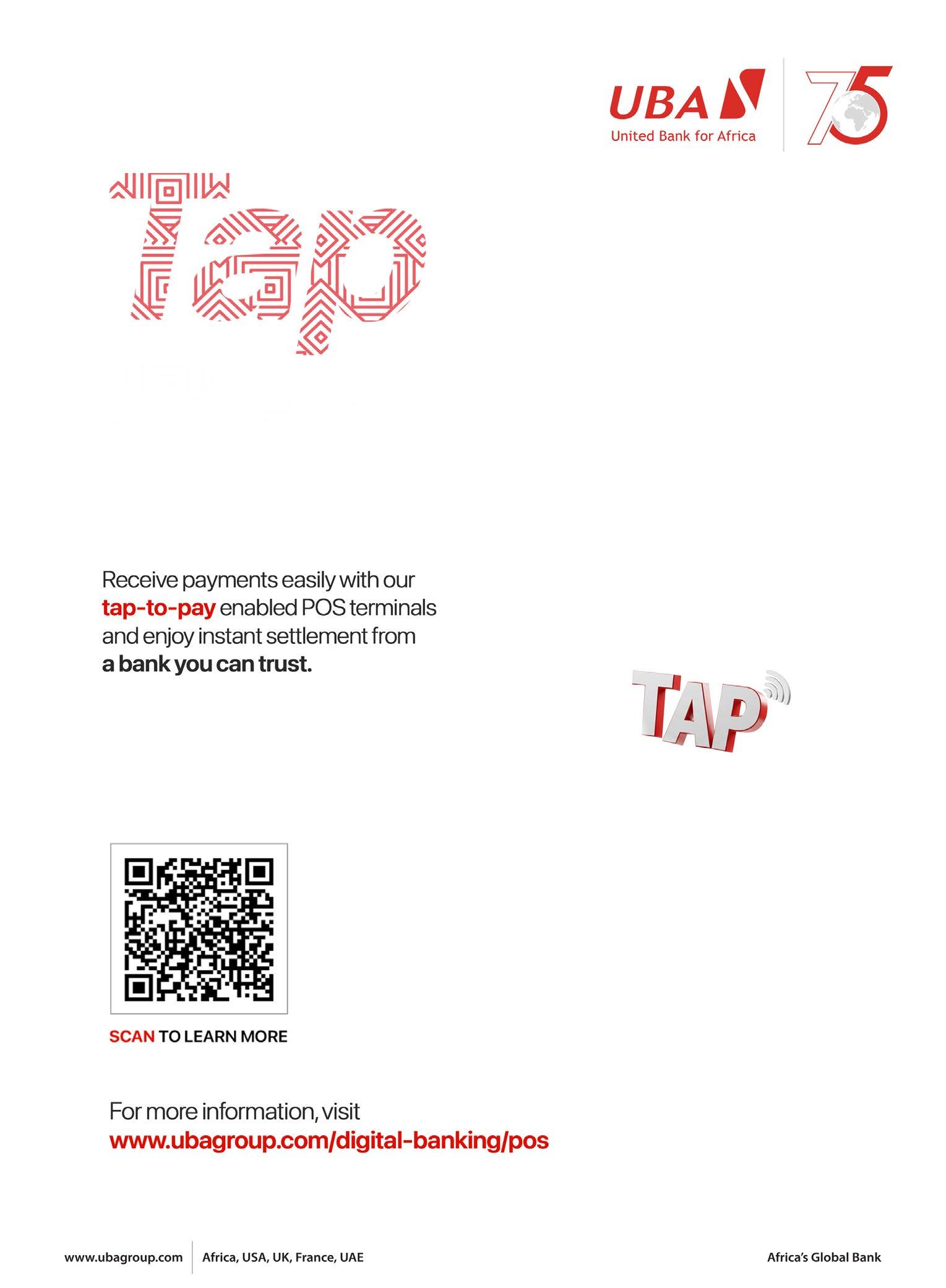


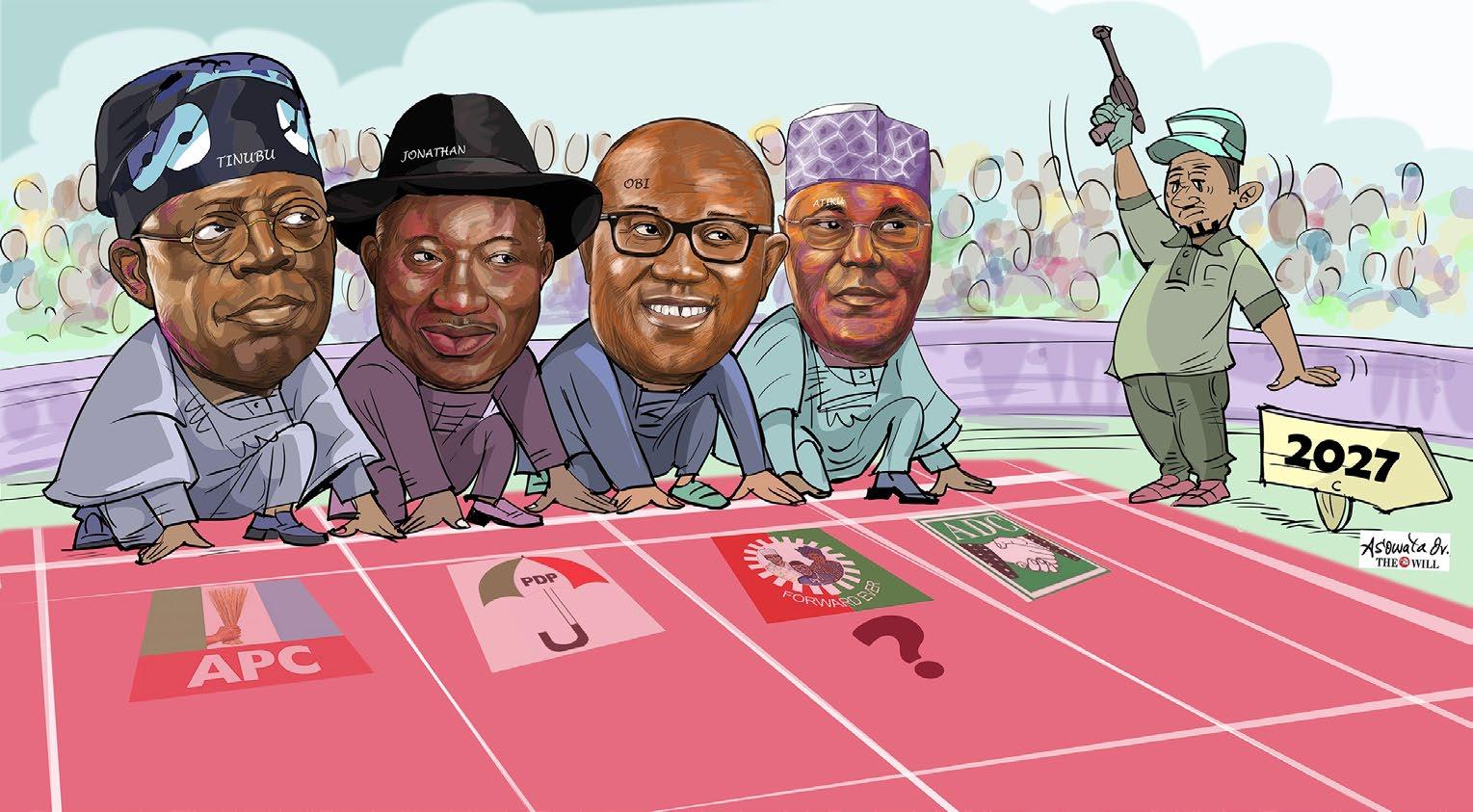
BY AMOS ESELE
Unfolding political events in the polity show that four powerful presidential candidates may square up in the 2027 presidential election. They are President Bola Tinubu for the governing All Progressives Congress, APC; former President Goodluck Jonathan for the major opposition Peoples Democratic Party, PDP, presidential candidate of the Labour Party in the 2023 election, Peter Obi and his former PDP counterpart, Atiku Abubakar.
For Jonathan, a second journey to the presidency, which stalled in 2022 when some APC big-wigs tried to draft him in as their party's candidate unconditionally, has started again, this time through the Peoples Democratic Party.
Believed to have been staged by late President Muhammadu Buhari’s nephew and influential adviser, Mamman Daura, as part of a clique’ s power control strategy, that move failed because Jonathan demanded for coronation rather than participating in an elective convention he considered too demeaning for his stature as former President.
Fast forward to 2025. That scenario is being re-enacted by the PDP, the former Presidents’ party, which is desirous of reclaiming the power which it lost, incidentally in 2015 under Jonathan.
a consultation before getting back to us.” While politically discerning Nigerians await the verdict of his consultations, analysts say the ex-President has a possible barrier to the consummation of his ambition. That is the Constitutional requirement that may check his eligibility.
For a man who was sworn into office to complete the tenure of late President Umaru Yar’Adua and then voted into office again, Section 137 subsection section 3 of the Constitution as amended, prevents him from running again for the same office of President.
The Constitutional amendment came into effect in 2018 after late President Muhammadu Buhari signed it into law. It states that, “A person who was sworn into office to complete the term for which another person was elected as President, shall not be elected to such office for more than a single term.”
Experts however argue that the Constitutional provision has been tested and supports Jonathan’s stand. The argument of those in support of Jonathan’s eligibility is based on the judgement by Justice Isa Dashem of Federal High Court in Yenagoa in a pre-APC convention suit filed by two members of the party in 2022, Andy Solomon and Idibiye Abraham seeking Jonathan’s disqualification from contesting the presidency again.
Jonathan, like he did with the APC, has reportedly agreed in principle to the idea of running on the party’s platform in 2027 as long as his usual preconditions are met, thus handing him the ticket on a silver platter.
Confirming Jonathan's consent to persuasions to contest the forthcoming election, the PDP’s Deputy National Publicity Secretary, Ibrahim Abdullahi last week said, “Some of the conditions he gave us were: to be given automatic ticket if he accepts to run. He also said he would have to make
Justice Dashem had ruled that barring Jonathan would mean applying the new law retroactively. According to the judge, the oath Jonathan took in 2010, following Yar’Ardua’s death, was in compliance with the provision of the Constitution and not because he contested and won an election.
FOUR- HORSES' RACE
In the event that Jonathan surmounts this Constitutional hurdle, the 2027 presidential contest will present an





the party leadership has repeatedly said would be the only mechanism through which its candidate would emerge. His allies have positioned themselves in the party for the great task ahead.
With this unfolding scenario, political strategists and tacticians would have their hands full with all kinds of permutations for the 2027 presidential election.
The four candidates likely to come from four geo-political zones in the country, where they are expected to perform better than their rivals, given the nature of identity politics in Nigeria, are President Tinubu who comes from the southwest, Jonathan from the South south, Obi from the Southeast and Abubakar from the Northeast. The Northwest and Northcentral will become battleground zones.
Still, the power of incumbency, in spite of the growing hardship and insecurity in the country as selling points for the opposition, is still a big factor to contend with in Nigeria's dysfunctional politics.
President Tinubu won the 2023 election with 8.79 million votes, followed by Atiku Abubakar of the PDP, who scored 6.98 million votes. Peter Obi of the LP got 6.1 million votes and Dr. Rabiu Kwankwaso of the NNPP got 1,496,687 votes. Kwankwaso is currently out of consideration in the unfolding presidential picture. His party, the New Nigeria Peoples Party, NNPP, is factionalised. In addition, his performance in the 2023 election was a home -based affair in Kano where he won the majority votes.
Considering the voting pattern in the 2023 presidential election, President Tinubu and the APC led with 53.59 per cent in the Southwest, followed by the PDP with 22.14 per cent and the LP with 19.97 per cent.
Tinubu and APC also won in the North Central Zone with 38.58 per cent, Obi and LP with 31.01 per cent, Abubakar and PDP with 25.46 per cent.
Tinubu and APC led in the Northwest zone with 39.54 per cent, followed by Abubakar and PDP with 34.87 per cent and LP with 4.08 per cent.
In the Southeast, Obi and the LP led with 87.79 per cent, with Tinubu and APC having 5.71per cent, while Abubakar and PDP scored 4.08 per cent.
Similarly, Obi and LP led in the South-South with 42.37 per cent, followed by Tinubu and APC with 27.99 per cent and Abubakar and PDP with 26.12 per cent.
In the North-East, Abubakar and the PDP won 50.67 per cent of the presidential vote, followed by the APC with 29.16 per cent and LP with 6.09 per cent.
While this result reflected the country’s diversity as the candidates and their parties got representations at the legislative and executive branches of government, the entry of Jonathan in the race will further add to the variety, pundits say.
Following the 2023 results, the two critical zones in contention would be the Northcentral and Northwest geopolitical zones.

The results of the 2023 presidential election, showed that President Tinubu led the pack in the North-Central and NorthWest geopolitical zones. But two years down the line, things are no longer the same. While there appears to be no serious challenge in the Northcentral as the ADC under Senator David Mark is still reorganising, the Northwest, which delivered the winning votes for President Tinubu in 2023, is under siege.
The largest concentration of late President Muhammad Buhari’s Congress for Progressive Change, CPC, membership comes from this zone and many are aggrieved over the alleged dominance of the Action Congress of Nigeria within the APC, leading to their perceived marginalisation. Majority of them
have threatened to dump the governing party and defect to ADC. This crisis has created a headache for the APC in the zone.
During the 2023 presidential election, for example, the NorthWest had a total of 6,468, 492 votes. Atiku won in four of the seven north-western states, namely Kaduna, Katsina, Kebbi and Sokoto. Tinubu picked two, Jigawa and Zamfara. But the half a million votes the President got in Kano tipped the scale in his favour. Thus, Tinubu beat Abubakar in the zone, scoring 2,652,824 votes, compared to the latter’s 2,197,824 votes.
and Obi of the Labour Party 28,513. Tambuwal and Governor Mohammed helped Abubakar secure victory in the NorthWest states of Sokoto, Kebbi, Kaduna and Katsina and in the North-East states.
On top of this emerging scenario in the Northwest is another threat. If President Tinubu were to drop Vice President Kashim Shettima in 2027, as has been speculated, the move would solidify the perception that he uses and dumps deputies at will, a tolerable move at the state level which becomes magnified into insensitivity at the national level because of the issues involved.


Interestingly, the North-West zone gave President Tinubu the highest number of votes in the 2023 election.
Tinubu got 30 per cent of the total number of 8,794,726 votes he scored in the 2023 election from the North-West.
The religious sentiment that worked in Obi's favour in the North-Central zone, leading to his resounding victory in two states in the zone, namely Plateau and Nasarawa states, may dwindle with the entry of Jonathan, a fellow Christian. Obi trailed President Tinubu in the zone, scoring 1,415,557 votes as against 1,760, 993, for the President. The trio of President Tinubu, Jonathan and Obi would slug it out in the zone, ending up sharing the votes.
Recall that President Tinubu got a whooping 5,346,404 votes of his total 8.79 million votes from the North, followed by Abubakar with 4, 834, 767 votes; Obi of LP with 2,080,247 votes and Kwankwaso of the NNPP with 1, 545, 649 votes.
For incoming Jonathan, analysts say northern politicians who are feeling nostalgic about his arguably better administration, in comparison to APC’s 10 years and have become vocal critics of the government may want to piggy back into power through him.
It is believed that the choice of a core establishment politician like second term PDP governor of Bauchi State, Bala Mohammed or Senator Aminu Tambuwal or even Dr. Rabiu Kwanwaso as running mate would give Jonathan a competitive edge in the North and redraw the electoral map for 2027. Tambuwal, Mohammed and Kwankwaso have strong electoral strengths that worked for their respective parties in 2023.
Kwankwaso defeated the three other candidates in his Kano home base, scoring 997,279 votes as against 517, 341 votes for President Tinubu, his closest rival, while Abubakar gor 131,716
“ The largest concentration of late President Muhammad Buhari’s Congress for Progressive Change, CPC, membership comes from this zone and many are aggrieved over the alleged dominance of the Action Congress of Nigeria within the APC, leading to their perceived marginalisation
The constituency and stakeholders involved are considerable. For example, a deputy governor who represents a senatorial zone or a federal constituency in a state, would loom large as a Vice President at the centre because his constituency would translate into a geo-political zone with many governors as potential allies.
Thus, an APC without VP Shettima would imply delivering Northeast geo-political zone to Abubakar, a likely ADC candidate, effortlessly. The VP’s removal would also become campaign material for anti-Tinubu politicians in the North generally. The fallout of the APC Gombe summit where delegates insisted the party must endorse President Tinubu for 2027 alongside Shettima is still festering.
In the 2023 polls, President Tinubu trailed Abubakar substantially in the North-East. He scored 933,176 votes as against Abubakar’s 1,741,846 votes. Shettima, however, delivered the votes of his home state, Borno, which Tinubu won with 252,282 votes, compared to Abubakar’s 190, 921 votes. As a possible candidate of the ADC, Abubakar is expected to perform better than other candidates in this geo-political zone than he did during the 2023 poll. His loyalists have since joined the ADC bandwagon and they are planting the party in the zone.
Another challenge facing the APC in the North-East is that the party and its main rival, the PDP are head -to- head in the control of the six states there: The PDP governs in Bauchi, Adamawa and Taraba, while APC governs in Borno, Yobe and Gombe. The coming of ADC through Abubakar into this zone will upset previous calculations, even though he is expected to improve on his performance because of the undercurrents over VP Shettima’s ‘treatment’, in addition to the growing hardship.
Obi won the Southern votes in 2023, scoring 4,020, 687 votes, followed by Tinubu with 3,026,969 votes, Abubakar with 1,751,047 votes and Kwankwaso with 42, 038 votes. Jonathan will share a significant proportion of the vote by reducing it to the Southeast zone where Obi comes from and the LP candidate in 2023 scored an overwhelming 87.79 per cent of the total votes cast in the region.
The South-South votes that Obi got in 2023 may shrink considerably in 2027. Jonathan is from South-South as against Obi, a core southeasterner. Each of the four candidates will explore the electoral weakness in enemy territory to advantage.
With the defection of governors from two critical states in the South-South from the PDP to APC- Sheriff Oborevwori of Delta State and his Akwa Ibom counterpart, Umo Eno, President Tinubu is expected to upgrade his poor performance in the zone in 2023. Contesting against two heavyweights like Jonathan and Obi would certainly challenge the electioneering skills of the president’s men in the South-South, where Tinubu scored 27.5 per cent in 2023.
Making a fair assessment of the current political climate at the weekend, a founding member of the PDP and former governor of Jigawa State, Sule Lamido, who welcomed the possible coming of Johathan into the 2027 race because of “ his pedigree, cool headedness and partnership,” noted that it is too early to say who will emerge president in 2027 because two years is a long time for things to change and present calculations to crash.
in the state at the weekend.
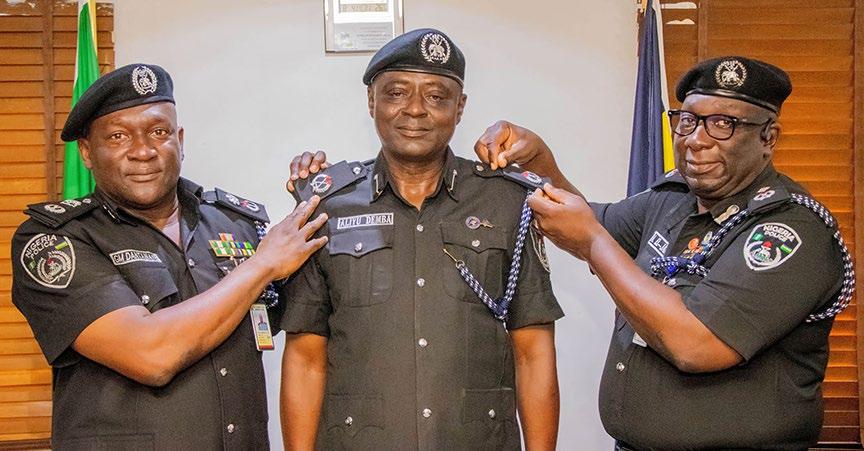
BY FELIX IFIJEH
The West African Examinations Council (WAEC) has reviewed the 2025 West African Senior School Certificate Examination (WASSCE) results initially released on Monday, following widespread public outcry.
The Head of Nigeria’s Office (HNO) of WAEC, Amos Josiah Dangut, who disclosed this to newsmen in Lagos on Friday, said the updated results show a significant improvement in candidates’ performance, with 62.96 percent now recorded as having credits and above in at least five subjects, including English Language and Mathematics.
Dangut said the review was prompted by concerns raised over the initial results, which reported a pass rate of only 38.32 percent in five subjects, including English and Mathematics.
He added that the reviewed results showed that 1,239,884, representing 62.96 per cent of the candidates, obtained Credits and above in at least five subjects.
“The council took immediate steps to address the concerns raised by stakeholders. After a meticulous review of the examination process and results, we are pleased to
announce that 62.96 percent of candidates achieved credits and above in a minimum of five subjects, including the compulsory English Language and Mathematics, ” Dr. Dangut said.
The HNO expressed that WAEC felt sorry for the previous error, which was caused by the mistakes from the team of service providers that marked the Objective part of the English Language examination. He noted that the regional exam body was deeply sorry for the errors, urging candidates to check the fresh results 48 hours later.
The Federal Government has said that more than 300 repentant terrorists are currently undergoing rehabilitation, while over 2,600 have completed the process under Operation Safe Corridor in Gombe State.
on Thursday during a stakeholders and donors’ meeting on promoting livelihood and agricultural opportunities for excombatants and communities affected by conflict.
and North-Central regions.
The National Coordinator of the National Counter Terrorism Centre, Maj-Gen Adamu Laka, made this known in Abuja
He explained that the programme provides psychosocial support, vocational training, and reintegration assistance, with plans to extend similar initiatives to the North-West
Laka added that a new agribusiness project, in collaboration with the International Institute of Tropical Agriculture, would provide land, inputs, training, and market access for both ex-fighters and vulnerable members of affected communities.
BY ABDULLAHI YUSUF
The Kano State Executive Council has approved the 2025 Proposed Supplementary and Amendment Budget of N889,277,880,957.81 for various state services.
Commissioner for Information and Internal Affairs, Amb. Ibrahim Abdullahi Wayya, disclosed this on Wednesday while briefing journalists on the outcome of the council’s 30th meeting.
The new figure represents an upward adjustment of N169,522,463,294.81 from the originally approved N719,755,417,663.00.
Wayya said the supplementary appropriation is designed to strengthen the government’s capacity to deliver on core mandates and meet emerging obligations.
He added that the council had directed the immediate transmission of the proposal to the Kano State House of Assembly for legislative action.
The council also approved N14,828,867,679.04 for various development projects across the state, including the conversion of Gaya Orphanage Home to a Female Drugs Reformatory Institute and the construction of a standard transit centre in Gaya LGA at a cost of N1.38bn, the revocation and re-award of the Jaba–Gayawa Road project for N3.75bn, the revocation and re-award of the dualisation of Dakata–Yadakunya (Bela) Road for N6.15bn, and the construction of Badgery Road to Yusuf Road in Nassarawa LGA for N522m.
For the Ministry of Land and Physical Planning, the council approved N129m for the printing of security documents by the Nigerian Security Printing and Minting PLC, and N754m for the expanded scope of work at the ministry.
The Ministry of Health secured approvals for the renovation of Sabo Bakin Zuwo Maternity Hospital at N364.5m, general renovation at the School of Health Technology, Bebeji, at N294.47m, installation of solar energy systems

in five maternity facilities at N114m, supply of drugs and consumables to three major hospitals at N112.35m, renovation of a newly procured house at Zango Quarters, Murtala Muhammad Specialist Hospital, at N272.18m, supply of materials to two wards at Muhammad Abdullahi Wase Teaching Hospital at N128m, and renovation and expansion at Zakirai Primary Health Care Centre (Phase I) at N379.28m.
For the Ministry of Water Resources, N310m was approved for the supply of 120,000 litres of diesel and 17,000 litres of PMS in February 2025. The Ministry for Rural and Community Development was allocated N169.63m for rehabilitating five mini earth dams in Madobi, Gwarzo, Garun Malam, Kibiya, and Ajingi LGAs.
Wayya reaffirmed Governor Abba Kabir Yusuf’s commitment to rebuilding a better Kano State through strategic governance and urged citizens to support and monitor project implementation.



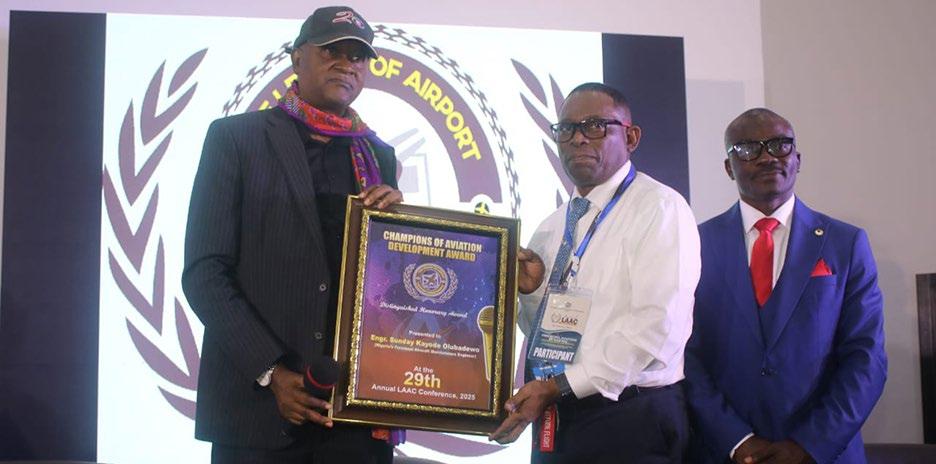
The National Working Committee of the Peoples Democratic Party has cautioned its members against endorsing President Bola Tinubu for re-election in 2027, describing such moves as anti-party activities.
In a statement on Thursday by its National Publicity Secretary, Debo Ologunagba, the PDP said public declarations of support for the All Progressives Congress in the next presidential

The Benue State House of Assembly has declined a request from Governor Hyacinth Alia to screen and confirm his nominees for commissioner positions, citing the governor’s alleged disregard for the legislature.
The decision was taken during Friday’s plenary session presided over by Speaker Hyacinth Aondona Dajoh, following a motion of urgent public importance moved by Hon. Shimapever Jiji.
He accused the governor of refusing to honour any resolution passed by the Assembly and of treating members with “total

election violate Section 10(6) of its constitution, which bars members from aligning with other parties or groups to undermine the PDP or any of its elected governments.
The party warned that members who fail to retract such endorsements would face stiff sanctions as prescribed in its constitution, noting that such actions have caused division and disaffection within its ranks.

“Of serious concern is the persistent public media outbursts against our party by some prominent members whose utterances and public pledges to work for the APC in 2027 pose a serious threat to the stability and sustenance of our party,” the statement read in part. The NWC urged members to remain loyal and focus on ensuring the successful conduct of its national convention scheduled for November 15–16, 2025, in Ibadan, Oyo State.
disregard.” Hon. Thomas Dugeri, who seconded the motion, said the governor had failed to address pressing issues previously raised by the lawmakers, insisting that he had shown no respect for the hallowed chamber.
Contributors to the debate stressed that the move was not intended to stall governance but to compel the executive arm to respect legislative independence and honour prior commitments.
They said they were not opposed to screening the nominees, but the governor must first meet agreed conditions.
Publisher of Sahara Reporters, Omoyele Sowore, has been released from police custody after being detained since Wednesday at the Nigeria Police Force headquarters in Abuja.
Sowore had honoured an invitation from the Inspector General of Police’s Monitoring Unit over petitions alleging forgery of a police document and cyberbullying. His detention sparked protests from his supporters, who demanded his immediate release.
The Assembly demanded that the governor immediately provide official vehicles to the affected members and enforce suspension notices earlier issued to the Chairman of the State Universal Basic Education Board, the Chairman of Otukpo Local Government Council, and the Executive Secretary of the Benue State Sports Lottery and Marketing Board.
In a statement, the Chief Press Secretary to the Speaker, Terver Zamber, said the House resolved not to honour or entertain any correspondence from the governor’s office until the demands are met.
During the protest on Friday, Commissioner of Police for the Special Intervention Squad, Abayomi Shogunle, said the police were seeking to identify Sowore’s source for the allegedly forged document.
Confirming his release in a Facebook live video on Friday night, Sowore described his detention as illegal and unjust.
“Nigeria Police Force has capitulated to the demands of the
revolutionary movement. I have been released from unjust, illegal, and unwarranted detention. However, it is nothing to celebrate, but thank you for not giving up! #RevolutionNow,” he said.
He expressed gratitude to former Vice President Atiku Abubakar, former Labour Party presidential candidate Peter Obi, human rights lawyer Femi Falana, and other Nigerians for their solidarity during his detention.
Former Minister of Agriculture and Rural Development, Chief Audu Ogbeh, has died at the age of 78.
A statement by his family on Saturday confirmed that the elder statesman passed away peacefully on August 9, 2025.
“It is with deep sadness that we announce the passing of our beloved husband, father and grandfather, Chief
Audu Ogbeh. He passed away at the fulfilled age of 78,” the statement read.
The family described him as a man who “departed peacefully, leaving behind a legacy of integrity, service and dedication to our nation and community.”
Ogbeh, a seasoned politician and administrator, served as Minister of Agriculture and Rural Development between
2015 and 2019. He was also a former National Chairman of the Peoples Democratic Party.
The family said details of his funeral arrangements would be announced later, while expressing gratitude to friends, colleagues and well-wishers for their prayers and support.
“We will appreciate some privacy at this time while we mourn the loss of our patriarch,” they added.
L-R: Permanent Secretary, Ministry of Women Affairs and Poverty Alleviation (WAPA), Mrs. Rianat Onigbanjo; Commissioner of WAPA, Mrs. Cecilia Dada; a graduate receiving her certificate and a working tool from the Governor, Mr. Babajide Sanwo-Olu; First Lady, Dr. Ibijoke Sanwo-Olu and Director, Skills Acquisition & Development Unit, WAPA, Mrs. Adejoke Oshodi-Olasukanmi during the 2024/2025 graduation ceremony of the Lagos State Skills Acquisition Centres at De Blue Roof, Agidingbi, Ikeja, on August 7, 2025.
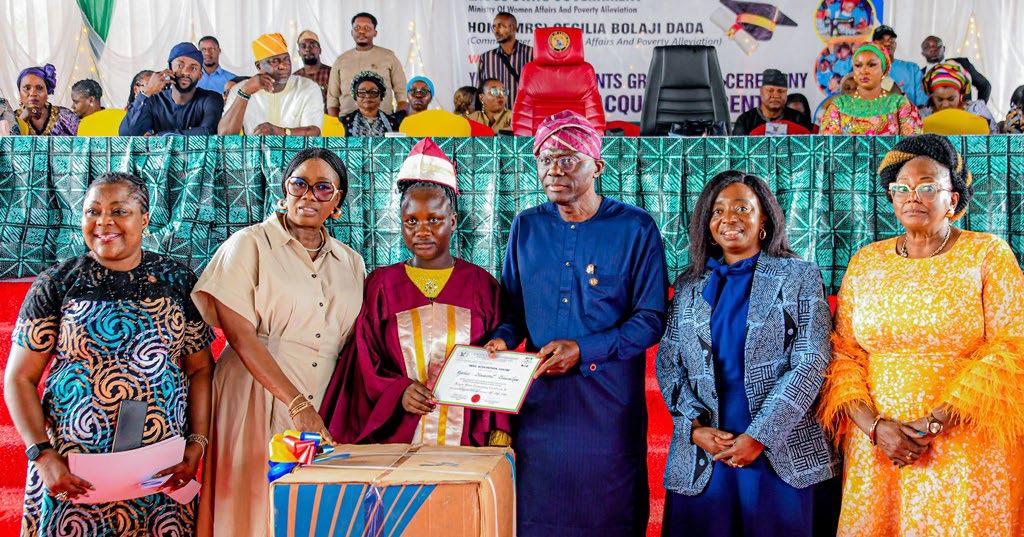
BY FELIX IFIJEH
Fuji music icon, Wasiu Ayinde Marshal, popularly known as K1 De Ultimate, has apologised over an incident at the Nnamdi Azikiwe International Airport, Abuja, that led to his temporary flight ban. The controversy erupted on August 5 when the Federal Airports Authority of Nigeria (FAAN) alleged that the 68-year-old attempted to board a ValueJet Airlines flight to Lagos with an “unidentified liquid substance.”
FAAN claimed the singer ignored aviation security (AVSEC) and the flight captain’s warnings, and even spilt alcohol on personnel while they tried to inspect his flask. This, the Authority said his “disorderly conduct” resulted in the suspension of two ValueJet pilots.
Kwam 1 initially maintained that the flask contained “plain drinking water” from the airport lounge, not alcohol.
The veteran musician, in a personally signed statement on Friday, expressed regret over the controversy but dismissed reports that he was caught with alcohol at the airport. He explained that he suffers from chronic dehydration, which requires him to always carry water on medical advice.
According to K1, the flask in his possession on the day contained only water, a precaution he said was necessary due to his chronic dehydration condition.
He said: “The incident that occurred at the local wing of the Nnamdi Azikiwe International Airport on August 5, 2025,
involving my humble self and ValueJet Airline was, to say the least, unfortunate.
“Unknown to many, I suffer from chronic dehydration, and my doctor strongly advised me to remain constantly hydrated. This is why I always carry a water flask with me. And contrary to the negative narrative being circulated in some quarters, the flask I carried on that particular day contained only water, not alcohol, as wrongly alleged.
“For the record, I passed through two security screenings with the flask empty. The flask was only filled with water in the lounge area, just before heading to the tarmac. This fact can be verified by the CCTV footage at the airport lounge. More so, I hadn’t even boarded the plane, let alone been deboarded.
BY ANTHONY AWUNOR
The Chairman/Chief Executive Officer of Air Peace, Dr Allen Onyema, has raised the alarm about the possible demise of airlines if the current tax regime is allowed to continue. Onyema said that with a very small profit margin, the five percent airlines pay for ticket fares to the Nigerian Civil Aviation Authority (NCAA) is affecting the airlines.
The operator gave the hint while speaking during the 2025 League of Airports and Aviation Correspondents (LAAC) Conference held on the 7th of August, 2025, in Lagos, with the theme: “Aviation Financing in Nigeria: The Risks, Opportunities and Prospects”.
He said, “So it is not as if you do not make a profit at all, but what is the margin of this profit? Again, taxation. The airline is going to have a tax death. We pay a lot of charges. And I keep on saying it, and I will say it as AON. The 5% we pay for ticket fares to the NCAA is affecting the airlines. Because you don’t make 5% gain. And they will tell you that money does not belong to you. It is the money you’re collecting from passengers, on behalf of us. No. It is already limiting your ability to charge for the tickets that you truthfully deserve. You can collect it directly from the passenger, so that whatever we collect from passengers will belong to us. So I am not saying that we should not pay anything to the government, but it has to be cost recovery. Even the ICAO principle is about cost recovery. What we are doing here
today is a matter of legislation.
“The five per cent has been legislated. And even now, in current tax reforms, I don’t know who put it there, that we have to go back to the regime of paying customs duties for imported aircraft, customs duties for imported spare parts, VAT of 7.5% for imported aircraft, and even ticket fares. The airline would die within 48 hours.”
He, however, expressed happiness that the Minister of Aviation and Aerospace Development, Festus Keyamo, has taken it up, warning that if Customs duties on imported aircraft parts, VAT and other taxes are ever implemented from January next year, airlines would die.
Speaking about airlines’ performances, Onyema said, “Yes. The truth is, it could be better. When you talk about deliverables to the stakeholders, you have to look at the amount of investment, and then, whatever you are getting back, is it commensurate with the amount you have invested? If you invest $100 million in aviation, maybe at the end of the day, you are expecting 3% profit or 5% profit. If you take $100 million to agriculture or to importation, you may get up to 70% profit at the end of the day.
On the National carrier, Onyema said, “I have heard all this talk about the national flag carrier. It is a moribund idea all over the world. The government has no business doing
business. It will fail like a pack of cards. The government has no business doing business. We can’t continue to do this to ourselves. And people are listening and thinking that is the truth. No.
“Air Peace is far bigger than some national carriers in Africa. Far bigger. Three times bigger. Do you know what it took Air Peace to go to London for seven years? You are fighting both internal conspiracies. You are fighting a foreign conspiracy. My country is stigmatised. What we should continue doing is to elevate our own. And we are carrying the burden of the entire industry. Because if we fail, the industry will continue to fail. It is my prayer. And may God Almighty accept my prayer that every Nigerian life should succeed.”
On alliances within the domestic carriers in the country, the Air Peace boss maintained that it is not true that Nigerian operators don’t cooperate with each other, emphasising that a Spring Alliance is already existing amongst the airlines.
“We do have alliances and cooperation. It is called Spring Alliance. If I have a problem, I can call Overland and take my passengers. It is happening. I don’t have to say it out loud. It is happening.
“The problem is that, remember, at any time you are calling the other airline, they may be full also. And we help each other. We do it”, Onyema stated.




President, Original Inhabitants Persons with Disabilities, Yakubu Festus (m); Jarumin Karu Chiefdom, Chief Dangana Jimiko (3rd l); other members and the pupils of the LEA Primary School Karu, during a sensitization and enlightenment campaign about original Inhabitants Persons with Disabilities, organized by Persons with Disabilities Multipurpose Cooperative Society in collaboration with MacArthur Foundation in Abuja on Wednesday, August 6, 2025.
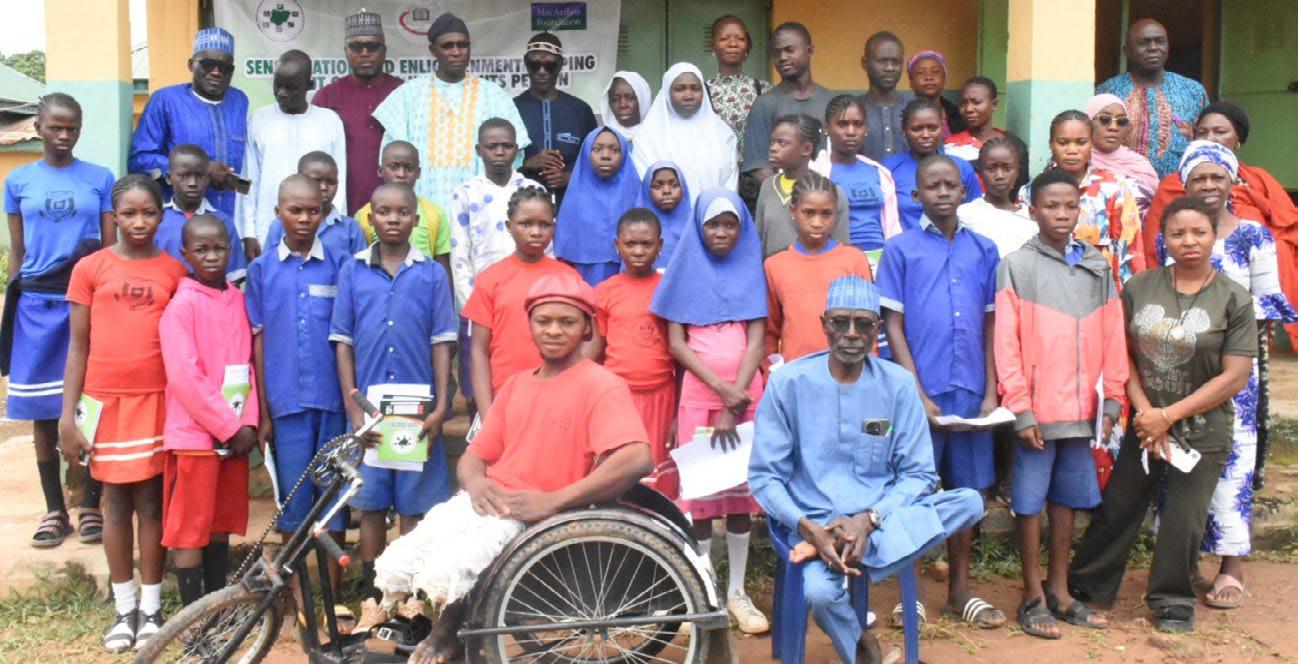
The Independent National Electoral Commission (INEC) has expressed commitment to enabling eligible inmates to vote in Nigerian elections, following a series of court judgements affirming their rights.
INEC Chairman, Prof. Mahmood Yakubu, made this known on Friday when he received the Comptroller General of the Nigeria Correctional Service, Sylvester Nwakuche, at the Commission’s headquarters in Abuja.
“We are aware that the right to vote is a human right which cannot be taken away from a citizen on account of time being served in a correctional facility. In many parts of the world, including some African countries such as Ghana, Kenya and South Africa, where our officials observed elections, inmates exercised the right to vote”, he said.
Yakubu pointed out the 2019 Court of Appeal judgement that upheld the right of inmates, particularly those awaiting trial, to register and vote in elections, emphasised the need for a “clear legal provision” to guide the process and ensure full compliance with electoral laws.
“You may recall that in recognition of this situation, the Commission had several discussions with the correctional
service on how inmates who wish to register and vote in elections can do so. We even set up a joint technical committee to review all the issues involved and advise on the way forward”, he said.
Yakubu cited the collaboration with the Correctional Service, including the provision of data on facility locations and inmate categories. He added that the Commission raised concerns about access for registration, polling unit creation, political campaigns, observer monitoring, and media coverage inside correctional centres. “Political parties also want to know if they will be allowed to campaign in the correctional facilities and appoint polling agents on election day. We believe that working together with you and the stakeholders, we can address these concerns”, he stated.
Yakubu pointed to the ambiguity of Section 12(1)(e) of the Electoral Act 2022, which restricts voting to Nigerian citizens not under “legal incapacity,” and called on the National Assembly to clarify whether that includes inmates on death row, life sentences, or treason convictions.
“Our immediate task is to engage with the National Assembly for a clear legal provision on inmate voting. Thereafter, we can address the specific issues that may arise in the course of

implementation”, Yakubu added.
In his remarks, Nwakuche urged INEC to extend electoral rights to inmates, noting that over 81,000 inmates are currently in custody across the country, with around 66 percent of them awaiting trial. He referenced a recent court judgement which reaffirmed that inmates, particularly those awaiting trial, have the constitutional right to vote.
While the Court of Appeal in Benin upheld the right of the five inmates who filed the suit in 2019, it declined to mandate INEC to create registration centres in correctional facilities. Despite that limitation, Yakubu assured that the Commission is determined to work within the law to enfranchise inmates where possible.
“The Commission is aware of the judgements of the Federal High Court in Benin delivered on 16th December 2014 and the Court of Appeal, also in Benin, delivered on 7th December 2018 pertaining to the right to vote by five plaintiffs awaiting trial. However, the judges ruled that the right to vote is only excisable when asserted as it is a choice to be exercised voluntarily by a citizen and not a duty to be imposed by force of authority”, he said.
BY ABDULLAHI YUSUF
The Kano State Government has resolved to address what it calls the rapid proliferation of slums and ghettos caused by the population explosion in the Kano metropolis.
The government also vowed to tackle the lingering housing deficit and overcrowding in the urban areas of the state.
This is contained in a statement signed by the Director of Public Enlightenment, Ministry of Housing Development, Adamu Abdullahi, and made available to newsmen in Kano on Friday.
Abdullahi said the State Commissioner for Housing Development, Arc Ibrahim Yakubu Adamu, disclosed the government's plan during the opening of a 2-day Management Retreat organised for the management staff of the ministry and held at NBTE Conference Hall, Kaduna.

He quoted the commissioner as reaffirming the determination of the state government to ensure the provision of qualitative, decent and affordable housing units that conformed with universally accepted standards.
Arc. Adamu further announced that henceforth, all new layouts in Kano would be provided with basic infrastructure needed to meet world standards, adding that such basic infrastructure had already been provided at the three cities of Kwankwasiyya, Amana and Bandirawo.
He said the ministry had been mandated to engage in public-private partnership (PPP) through collaboration with private stakeholders to boost housing delivery in the state.
He said the Ministry is poised to implement housing policies that would enable the

provision of affordable, available, decent and accessible housing for residents of the state.
The commissioner said the theme of the retreat: "Building High Performance Organisation for Accelerated Housing Development in Kano State" signified the commitment of the Abba Kabir Yusuf administration to put in place effective machinery of moving the State to greater heights.
He enjoined the participants to pay serious attention to all the presentations at the retreat
so as to acquire more knowledge and skills that would enable them to effectively and efficiently face the challenges of the housing sector.
BY FELIX IFIJEH
Ina move that may significantly reshape the political landscape ahead of the 2027 general election, the Independent National Electoral Commission,INEC, on Thursday commenced the shortlisting of associations that have met the criteria to advance to the next stage of registration as political parties.
Stating that the applications have risen to 151, the commission’s National Commissioner and Chairman of the Information and Voter Education Committee, Sam Olumekun, said the shortlist of successful associations will be made public immediately after the August 16 byelections.
“Since the fourth update released on July 23, 2025, the commission has received eight more letters of intent from associations seeking registration as political parties, bringing the total to 151.
“Having created the portal for party registration, the commission has commenced shortlisting associations that meet the requirements to proceed to the application stage. Details will be released immediately after the byelections in 12 states scheduled for Saturday, August 16, 2025,” Olumekun said.
Since the Commission first announced the applications publicly, barely two months ago, the number has climbed up speedily, first from 102 to 122 and then suddenly last week, to I51.
The list includes associations that are linked to aspiring presidential candidates, some of whom are from political parties that are so crisis ridden that even the verdict of the Supreme Court on party supremacy in resolving disputes has not helped matters, as the judgement has been interpreted subjectively by the combatants.
Notable examples in this regard are the proposed parties, the All Democratic Alliance, ADA and the Obidient Peoples Party, OPP, and the Progressive Obidient Party, POP. While ADA is said to be linked to a coalition of prominent political figures like former Vice President Atiku Abubakar, exKaduna State Governor Nasir El-Rufai and former Rivers State Governor Rotimi Amaechi, the OPP and POP are linked to Peter Obi, Labour Party leader.
Although Abubakar, El-Rufai, Amaechi, alongside Obi have adopted the existing African Democratic Congress, ADC, as their coalition platform for the 2027 poll, analysts say the registration of ADA and OPP or POP could unfold a new scenario as some of the prominent coalition partners like Atiku and Obi are yet to formally join the ADC.
Atiku resigned his membership of the PDP a fortnight ago. Obi’s LP is still factionalised with Julius Abure and Senator Nenadi Usman each heading factions. The crisis in the LP was underscored by INEC last week when it rejected candidates on the Abure-led platform for the upcoming by-elections across the country.
Registration of either the OPP or POP would give Obi a new platform as the Obidient Movement is said to be experiencing frustration in merging seamlessly into the ADC structure. The Movement is said to be spreading fast across the country, having registered members in wards and units in 23 states of the country.
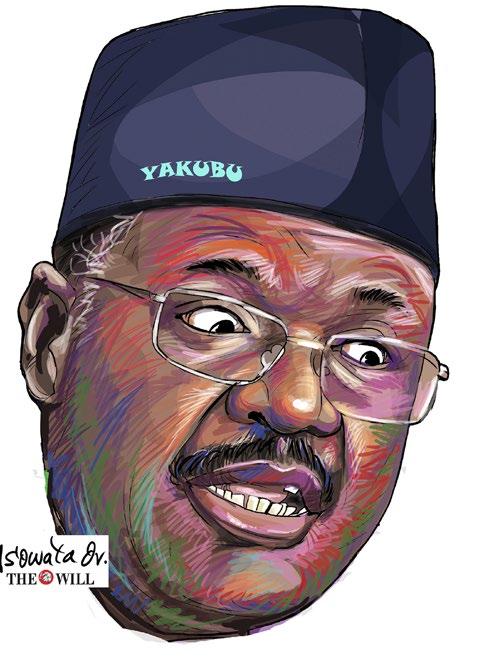
understanding was adopted by politicians at the beginning of the current democratic dispensation, but it has proven to be an expediency that ignored the geopolitical configuration of the country.
Meanwhile, INEC, which announced that all the applicants will be screened according to laid down legal and procedural requirements, also identified many violations in the submitted applications.
For example, many of the associations used identical names and in some other cases, duplicated associations, while others have no interim chairman and national secretary as well as logo, all of which violates the commission’s guidelines.
Three applications—New Green Generation Party, New Green Congress and New Green Coalition Party— reportedly listed the same individuals, Mallam Idris Abdulkarim and Ambassador Crystal Ikechukwu Ogu, as Protem National Chairman and Secretary, respectively.
INEC also reportedly found out that the Republican Party of Nigeria submitted two separate applications, each with different leadership and addresses.
“One was led by Col. Vincent Enemoma Abu and Buhari Yakubu with an office in Mabushi, Abuja, while the other, led by MD Coma and Chief Abu Ali, listed an address behind Utako Market. Some applications had acronyms similar to those of previously deregistered parties and a number of submissions were made by legal representatives or conveners without including the names of party officers, contrary to INEC’s regulations,”
Others include the Republican Party of Nigeria, Sceptre Influence Party, Young Democratic Congress, Patriotic Nigeria Party, Far Right Party, Democratic Peoples Party, United Citizens Congress, Reset Nigeria, New Nigeria Democratic Party, Save Nigeria People Party, Above All, Alliance for Youth and Women and Rebuild Nigeria Group.
Still some of the applications are composed of Citizens Progressive Party, Guardian Party, Abiding Greatness Party, Patriotic Party, Development and Freedom Party, Peace, Unity and Prosper Culture, The Populist, New Nigeria Leadership Party, All Allies Alliance, National Action Network, Coalition for Nigerian Democrats, Abundance Africa Alliance, Free Will Humanitarian Party, People’s Emancipation Party, Peoples Liberations Congress Party, and Peoples Democratic Congress.
Still in the list are Key of Freedom Party, Absolute Congress, All Grassroot Party, Congress Action Party, United Social Democrats Party, National Action Congress, New Nigeria Congress, United People’s Victory Party, Allied Conservative Congress, Peoples Freedom Party, Abundant Social Party, All Nigeria’s Party, Citizens Party of Nigeria, National Freedom Party, Patriots Party, and Movement of the People.
Peoples National Congress, Alliance of Patriots, African Union Congress, Socialist Equality Party, About Nigeria Party, Africa Reformation Party, Accelerated Africa Development Association, Obedient People’s Party, Zonal Rescue Movement, Zuma Reform, Party for Socialist Transformation, Liberation Peoples Party, Progressive Obedient Party, and Great Nigeria Party, make the list under consideration by INEC.
Other applicants are National Youth Alliance, National Reform Party, Patriotic Congress Party, Community Alliance Party, Grassroot Alliance Party, Advance Nigeria Congress, All Nigerians Alliance, All Labour Party, Team New Nigeria, About All Nigeria, Nigeria Liberty Movement, National Democratic Party, and Citizen United Congress.
Additional proposed parties include All Gender Party, Polling Units Ambassadors of Nigeria, Village Intelligence Party, Great Transformation Party, Alliance Social Party, Nigeria Democratic Alliance, New National Democratic Party, Nourish Democratic Peoples Congress, All Youth Reclaim Party, Marina Multipurpose Cooperative Society, Alliance Youth Party of Nigeria, The True Democrats, Democratic People’s Congress, National Democratic Movement, Economic Liberations Party, and Grassroot Ambassadors Party.

Though with the coming of ADC, the polity may be said to have three strong parties for now, registration of OPP or POP may add the number to five and create a multi-party climate that would significantly change the political landscape and bury for ever the so-called political understanding that compels parties to adopt the North/ South principle in choosing presidential candidates. That

Some of the applicants are All for All Congress, Peoples Democratic Alliance, United Youths Party of Nigeria, Peoples Liberations Party, Democratic Union for Progress, Citizen Democratic Alliance, Africa Action Group, Patriot Alliance Network, Democratic Leadership Party, Pink Political Party, Young Motivation and Awareness for Development Forum, Access Party, and Young Progressive Empowerment Initiative.
Stating that the applications have risen to 151, the commission’s National Commissioner and Chairman of the Information and Voter Education Committee, Sam Olumekun, said the shortlist of successful associations will be made public immediately after the August 16 by-elections







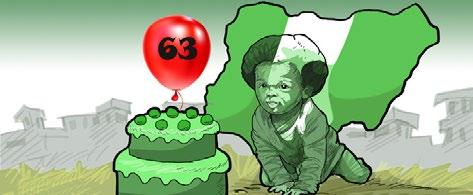







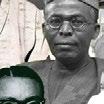





Page N600, 000

000
Double Spread Half Page N1, 200, 000
10X6 N700, 000
10X5 N650, 000
10X4 N600, 000
10X3 N500, 000
9X6 N440, 000
9X5 N395, 000
9X4 N335, 000
9X3 N310, 000

8X6 N410, 000

8X5 N380, 000
7X5 N320, 000



7X4 N315, 000

6X5 N280, 000

6X3 N145, 000
6X2 N85, 000
5X2 N70, 000
4X4 N160, 000
4X3 N95, 000
4X2 N65, 000
3X3 N60, 000
3X2 N50, 000
2X2 N30, 000
2X1 N15, 000 1X1 N7, 000
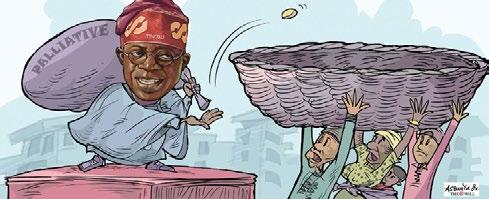









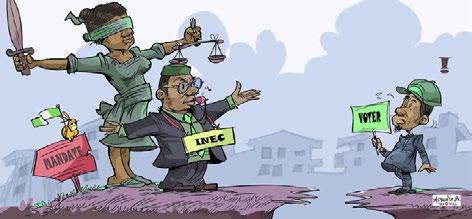



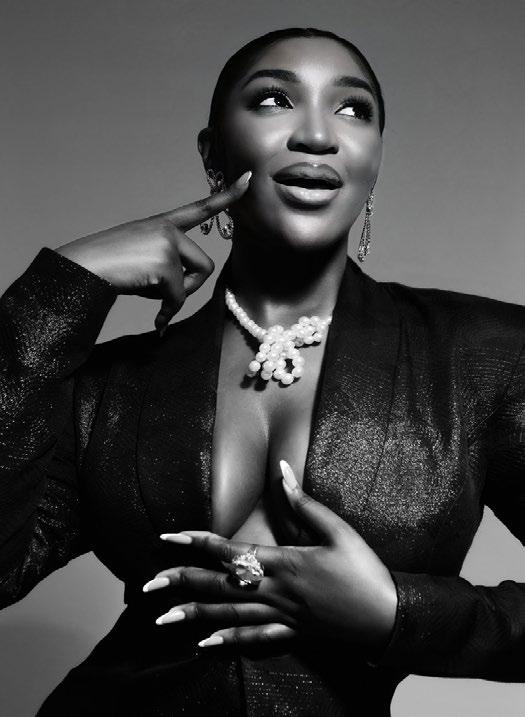









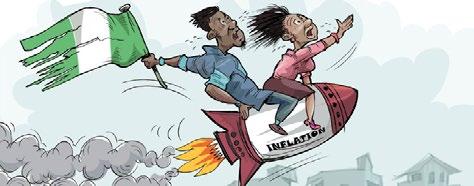
























The admission by the West African Examinations Council (WAEC) on Friday that it reviewed the 2025 West African Senior School Certificate Examination (WASSCE) results initially released on Monday, following widespread public outcry, leaves much to be desired.
According to the Head of Nigeria’s Office (HNO) of WAEC, Amos Josiah Dangut, the updated results show a significant improvement in candidates’ performance, with 62.96 percent now recorded as having credits and above in at least five subjects, including English Language and Mathematics.
Surprisingly, Dangut said the review was prompted by public concerns raised over the initial results, which reported a pass rate of only 38.32 percent in five subjects, including English and Mathematics.
The reviewed results he disclosed showed that 1,239,884 candidates, representing 62.96 per cent, obtained credits and above in at least five subjects.
“The council took immediate steps to address the concerns raised by stakeholders. After a meticulous review of the examination process and results, we are pleased to announce that 62.96 percent of candidates achieved credits and above in a minimum of five subjects, including the compulsory English Language and Mathematics, ” Dr. Dangut said and offered profuse apologies, having noted that the previous error was caused by the mistakes from the team of service providers that marked the Objective part of the English Language examination.
The substance of Dangut’s admission of guilt is that if stakeholders had accepted WAEC’s negligence and incompetence in handling this year’s result, it would have passed its failure to the candidates and held on to its initial submission that the 2025 WAEC was the worst performance in a decade.
This awful development recalls a similar incident

We hope the current Minister of Education, Dr Tunji Alausa, is taking notice of these developments that may continue to reduce the education sector in the estimation of the discerning public. Recently, the minister directed WAEC and the National Examinations Council, NECO, to transition to computer- based testing by 2026, with 2027 as the cut off date for 100 per cent compliance
BUREAU: 36AA Remi Fani-Kayode Avenue, GRA, Ikeja. Lagos, Nigeria.
810 345 2286, +234 913 333 3888
involving the Joint Admissions and Matriculation Board, JAMB, which admitted glitches in its 2025 Unified Tertiary Matriculation Examination, UTME, after widespread public outcry and condemnation of its poor performance by stakeholders. As a result of the concerns, JAMB, which had initially blamed parents and bad students for its woeful performance had to swallow its pride and made 379,997 candidates to retake the examination, even under worse conditions.
In 2023, the Independent National Electoral Commission, INEC, blemished the result of the presidential election through a ‘glitch.’ Similar technical glitches have been reported by institutions that have a direct impact on the wellbeing of Nigerians.
There is no question that institutional decay has set in the Nigerian system and unless some drastic corrective measures are taken, a disaster of an unknown magnitude may be facing the nation in the coming years.
In a way, these institutional shortcomings and professional incompetence are a sad reflection of a leadership vacuum, moral decay, institutional corruption, particularly in governance and bureaucratic inertia, that have all contributed in no small measure to the overall decline in sectoral performance of which education is one.
While we commend the public and partners for raising concerns over the mentioned deplorable conditions as they cropped up and the authorities for responding promptly, we urge all the relevant parties to the situation to synergise for the avoidance of future recurrence.
We hope the current Minister of Education, Dr Tunji Alausa, is taking notice of these developments that may continue to reduce the education sector in the estimation of the discerning public. Recently, the minister directed WAEC and the National Examinations Council, NECO, to transition to computer- based testing by

THE TEAM
PUBLISHER/EDITOR-IN-CHIEF




BY CHETA NWANZE
In today’s Nigeria, a particular type of advertisement has become common, revealing a darker story beneath its glossy surface. For instance, I got an advert on WhatsApp this morning for a “very clean, neatly used in Nigeria 2012 facelifted to 2020 Lexus GX460 luxury edition SUV” with a price tag of N26.5 million. On the face of it, this is a pitch for a prestigious, luxury vehicle, laden with gadgets and promising a certain status. However, a closer look at this advert uncovers a disturbing narrative about how poverty and social insecurity are exploited in Nigeria, twisting the aspirations of the populace into a tool for exploitation.
The most glaring detail is the claim that a 2012 model has been “facelifted” to resemble a 2020 version. In reality, this is a purely cosmetic deception. The seller may repaint panels, swap badges, and install new screens for entertainment, but the car’s fundamental components—its engine, frame, safety features, and core architecture—remain those of a 13-year-old vehicle. These superficial “upgrades” do nothing to improve the car’s reliability or its underlying technology. Yet, these claims are used to justify an exorbitant price tag, preying on buyers who are desperate for the social recognition that a newer-looking luxury car promises.
The conversation sparked by such adverts cuts to the very heart of Nigeria’s social dynamics. As one commentator remarked, “One of the things about being poor is being exploited”, while another noted that the advert “preys on our need for social acceptance and validation”.
Therefore, the price is not just a financial burden but a psychological one. In a society where success is often judged by outward displays of wealth—such as owning a large car, wearing designer clothes, or living in an opulent home—the need for validation becomes a significant vulnerability.
Sellers understand this dynamic perfectly. They apply minor cosmetic changes and demand inflated prices, knowing that the market’s deep-seated insecurity will guarantee a demand for the product, irrespective of its actual value. For the majority of Nigerians, N26.5 million is a vast sum, often representing a whitecollar worker’s entire lifetime earnings. The paradox is that this

fortune is being spent on a single, ageing SUV. The practical utility of such a vehicle for most Nigerians is highly questionable, given the high cost of petrol, the poor state of the roads, and the astronomical maintenance costs.
This phenomenon highlights what could be described as “facelift fraud”, an industry built on deception. Because many consumers lack extensive knowledge of automotive engineering and are driven by a desperate desire for social validation, fraudulent sellers can thrive. The local culture has created a “Nigerian Trap”, where appearances take precedence over substance. Owning a “2020” Lexus, regardless of its true age, is a signal of having joined the successful elite. This widespread pursuit of status has led to exploitative markets and a population burdened with unreliable, outdated goods at the price of new ones. This pattern extends beyond cars to other sectors, including clothing and real estate, where sellers continuously weaponise insecurity against the most vulnerable.
This exploitative cycle also points to a more profound issue: “mental poverty”. This is not simply a lack of money but a deficiency in critical thinking, self-worth and a healthy scepticism. When a society values superficial labels over true substance and seeks validation through possessions rather than genuine achievements, these exploitative dynamics become inevitable. Mental poverty leads to a cycle of negative outcomes for society. Individuals make poor purchasing decisions, overspending on appearances rather than facts. The market becomes saturated with scams and substandard products, which drags down overall quality. Ultimately, societies stagnate because people’s efforts are channelled into chasing status instead of pursuing real, meaningful progress.
IN A SOCIETY WHERE SUCCESS IS OFTEN JUDGED BY OUTWARD DISPLAYS OF WEALTH— SUCH AS OWNING A LARGE CAR, WEARING DESIGNER CLOTHES, OR LIVING IN AN OPULENT HOME—THE NEED FOR VALIDATION BECOMES A SIGNIFICANT VULNERABILITY
BY MUHAMMAD MUSA-GOMBE
When one reads comments from some prominent Nigerians in the Diaspora, it is often with a mixture of pride and trepidation. Pride because they represent the best of what this country has produced. Trepidation because sometimes they speak of Nigeria in tones that betray a disconnect from its historical truths, its social contract and the deeper meanings behind the institutions that shaped them.
Kemi Badenoch, the British opposition leader (Conservatives) recently commented in an interview about her time as a student at Federal Government Girls College (FGGC) Shagamu. She described the school environment in dismal terms, with unkempt toilets, grass-cutting as punishment and the general condition of the school.
For anyone familiar with Nigeria’s education system, these are not unfamiliar experiences. Yet, one is forced to ask: was that all she took away from her years at a Unity School?
I am a product of a Federal Government College, proudly FGC Kaduna. Like many alumni of Unity Schools across Nigeria, I recall grass-cutting, toilet cleaning, and sweeping assembly grounds, as a regimen that today’s students might consider harsh. But looking back, we know better. These were not acts of punishment. They were acts of molding.
Recall Unity Schools were born out of the ashes of the Nigerian Civil War (1967–70), a period that tested the very soul of our nation. In response, the then Federal Government established these colleges along with the National Youth Service Corps as platforms to foster healing, integration and national consciousness. Students from all corners of the federation, different ethnicities, languages, religions and social classes lived together, learned together, quarreled and fought together, and matured together. That was the point. Pro Unitate was not just a motto, it was a mission.
To that end, discipline was not optional. Responsibility was not outsourced. Every student, regardless of whether they were from affluent homes or modest backgrounds, had a chore, a communal task that taught humility, accountability and teamwork. Grass cutting? It taught endurance and patience. Toilet cleaning? It taught that dignity is not in detachment from manual work but in embracing it. These tasks may probably appear crude in the West, but in the African context, they were (and still are) extensions of home training and moral upbringing.
The cultural disparity between the West and Africa has left Kemi Badenoch culturally stranded in defining her objective. Badenoch’s reference to these
Breaking this vicious cycle requires a significant investment in education, self-awareness, and cultural reform. Nigerians, like people in any society, must learn to distinguish between genuine success and its fraudulent imitation. Empowered and critical thinking are the essential antidote to this form of exploitation.
experiences as appalling misses a crucial point. Just like a soldier doesn’t describe crawling in trenches or enduring cold nights as punishment but as preparation, our daily routines at Unity Schools were part of a broader curriculum a non-academic one that prepared us to face life head-on. If she rose to become a respected British Cabinet Minister, perhaps she might credit not just the books she read, but the steel that those so-called “punishments” forged in her.
This is not to deny that the infrastructure in many Unity Schools leaves much to be desired it did then and it does now. The challenge of underfunding, corruption and poor maintenance culture is real. But to frame the entire Unity School experience around these deficiencies is to rob it of its higher ideals and the values it instilled. Let us not forget: In these schools, children of generals, governors, diplomats, farmers, civil servants and market women all shared the same dormitories, ate the same meals, cleaned the same toilets and cut the same grass. That, in itself, was the magic. In those shared spaces, Nigeria was being reborn daily from the bonds formed by Hausa and Igbo bunkmates, Yoruba and Tiv classmates, to Fulani and Ijaw, Ibibio and Kuteb prefects who debated in literary societies.
What the Federal Government Colleges did and still strive to do is more than produce students who pass WASC exams. They produce Nigerians: Nigerians who can see beyond tribe and tongue, who know how to work with their hands and who understand that leadership begins with service. Perhaps Badenoch passed through FGGC Shagamu, but it is fair to wonder: Did the school pass through her? Did it?
Nigeria is not perfect and neither are its institutions. But if those of us who benefited from them refuse to recognise their value, especially when speaking on international platforms, then we do a disservice not just to history, but to the generation that will come after us.
THE CHALLENGE OF UNDERFUNDING, CORRUPTION AND POOR MAINTENANCE CULTURE IS REAL. BUT TO FRAME THE ENTIRE UNITY SCHOOL EXPERIENCE AROUND THESE DEFICIENCIES IS TO ROB IT OF ITS HIGHER IDEALS AND THE VALUES IT INSTILLED
My piece should serve not only as a reminder to Kemi Badenoch, but as a gentle call to all Nigerians abroad: Never forget the spirit behind the schools and systems that shaped you. Their imperfections do not cancel out their impact. If anything, they enhance it.
As a country, we must continue to improve our schools, yes. But we must also preserve the ethos behind them.
The Federal Government Colleges, like NYSC, remain some of the few remaining threads holding the idea of Nigerian unity together. And in these polarised times, we need them now more than ever.
•Mr Musa-Gombe, an alumnus of FGC Kaduna, is a media practitioner who lives in Abuja



Continues from page 34
making debt servicing the largest expenditure item.
“This is unsustainable, especially as the amount surpasses the combined budgets for defence, security, infrastructure, education, and health, which total N14 trillion. The recent legislative approval of an additional US$21 billion in borrowing is a red flag,” the financial analyst and investment banking expert noted in his HalfYear Update on the Economy made available to THEWILL

He highlighted the importance of supporting the domestic processing companies to make essential items like bread and cooking oil more affordable to ordinary citizens. He also stressed that macroeconomic progress doesn’t always translate to tangible improvements in the lives of everyday Nigerians.
Continues from page 34
stated that the joint crisis preparedness framework could be dealt with under the auspices of the Financial Services Regulation Coordinating Committee.

Adebajo noted that the oil and gas sector grew by 10.2 percent in 2024, with US$3 billion in investments. To sustain growth and optimize production, Nigeria must emulate the investment levels of US$22 billion seen in 2009 and 2014. Ultimately, the success of this budget cycle and the broader reform effort depends on recalibrating expenditures as advised by the World Bank and IMF, and on implementing coordinated, sustainable economic policies.
“The same sincerity and commitment that delivered initial economic stability must now be applied to the unified and coherent execution of monetary, fiscal, trade, industry, and investment policies. This is the decisive factor. There is growing concern, however, that the government’s focus is shifting from economic reform to re-election and political considerations,” Adedayo stated
He added, “The economy has achieved stability with key economic indicators moving in the right trajectory after 26 months of reforms. However, reforms alone cannot put the economy on the path of sustainable growth. GDP growth declined from 3.8 percent in Q4
“Reform Fatigue has led to an Economic Quagmire as the government faces the reality that reforms alone cannot pull the economy out of stagflation to the path of sustainable growth.
“The outcome is an over 200 percent currency devaluation, debt in excess of US$100 billion and an economy deep in stagflation. Households and firms are bearing the brunt of the reforms, with low purchasing power, low productivity, high interest rates and
In his assessment of the current economic situation, Dr. Muda Yusuf, CEO of the Centre for the Promotion of Private Enterprises, emphasised the need for a shift towards a more productive economy,
Recommending the way out, Yusuf stressed on the need to focus on growing production.
He advocates for direct support to companies involved in processing essential food items as a way to make these goods more accessible and affordable to the general public.
The entrepreneur development expert pointed out that the disconnect between overall economic growth (macroeconomic) and the lived experiences of citizens should be evaluated based on their impact on the daily lives of people.
Dr. Yusuf’s message centers on the idea that a thriving economy requires a focus on supporting production, making goods accessible, and ensuring that the benefits of economic growth reach the majority of the population. He emphasised on fixing the troubled power sector.
The finance minister, and coordinating minister for the economy, Wale Edun, has welcomed the Capital Importation figures, by the NBS, viewing them as a positive sign for sustained economic growth.
However, the data shows the growing disconnect between rising capital inflows and actual productive investment in the Nigerian economy. While the surge in total capital importation may seem positive on the surface, a closer look reveals that over 90 percent of these inflows were channeled into short-term money market instruments—such as government bonds and treasury bills—rather than long-term equity or direct investment.
Industry analysts believe that this trend raises concerns about the sustainability and economic impact of Nigeria’s current capital inflow structure. FDI, which typically signifies a vote of confidence in the host economy through infrastructure development, factory construction, and job creation, is now being dwarfed by volatile inflows that can easily exit at the slightest macroeconomic shock.
She explained that the CBN was in the process of enhancing the Credit Risk Management System to integrate the Global Standing Instruction, which will allow for the onboarding of Other Financial Institutions.
Earlier in his address, the NDIC MD/CE commended the CBN for its reform programmes under the leadership of Mr Cardoso, particularly the stabilisation of the forex market as well as the ongoing recapitalisation of banks.
He stated that the NDIC was committed to aligning its operations with the NDIC Act 2023 (as amended), explaining that the Corporation was in the process of embarking on a strategic restructuring to better align operations with its risk minimisation mandate as well as developing a new corporate strategy, as the one in use was due to expire at the end of the current year.
Mr Sunday reiterated the NDIC’s willingness to collaborate with the CBN towards enhancing financial system stability, expressing appreciation for the CBN’s support in premium collection from insured institutions.
He also outlined the Corporation’s recent milestones, to include the payment of N54.62bn to 691,418 depositors of the defunct Heritage Bank, the declaration of a liquidation dividend of 9.2 kobo per naira to uninsured depositors within a year of closure, and the ongoing efforts to develop a target funding framework.
The NDIC Chief Executive used the opportunity to list some challenges facing the Corporation, including the absence of a unique identifier such as the Bank Verification Number for corporate customers and the difficulty in collecting premiums from insured institutions that do not maintain accounts with the CBN. He expressed the willingness of the Corporation to work with the CBN to address these gaps.
The NDIC team included the Executive Director of Operations, Dr Kabir Katata; Director, Human Resources, Mr Yakubu Shehu; Director, Legal Department, Mr Olufemi Kushimo; and Assistant Director, Communications & Public Affairs Department, Mrs Regina Dimlong.
Mr Thompson Sunday succeeded Mr Hassan Bello whose 5-year tenure expired in 2025. His tenure witnessed significant achievements and put NDIC on a global spotlight.
marking a 54% year-on-year increase. Shareholders’ Funds also rose by 25% to ₦166.91 billion, reinforcing investor confidence in the Group’s long-term outlook. Following this solid performance, United Capital has declared an interim dividend of ₦5.4 billion (₦0.30 per 50 kobo ordinary share).
Pan-African investment bank and financial services group, market leadership with the release of its unaudited financial results for H1-
This half-year result builds on a consistent five-year growth streak from the Group. Since H1-2020, United Capital’s profitability has surged by over 522%, rising from ₦1.91billion in H1-2020 to ₦11.89 billion in H1-2025, while revenue has also grown significantly from ₦4.45 billion to ₦23.76 billion. This performance demonstrates United Capita’s resilience and ability to deliver value year after year, despite shifting economic conditions.
During the Group’s Investor Call held yesterday in Lagos, Mr. Peter Ashade, Group Chief Executive Officer of United Capital Plc,
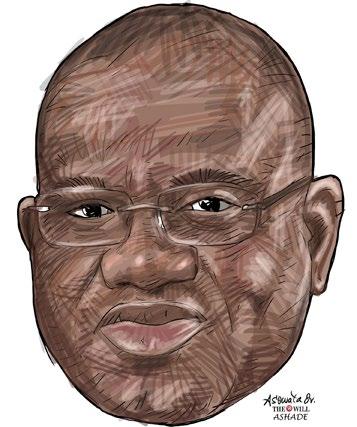
commented on this performance saying:
“We are pleased to report that we ended the first half of the year on a strong and positive note. Once again, we have continued our track record of excellence and strong financial performance, which reflects the strength of our diversified business model.
“Last year, we made history by declaring our first-ever interim dividend, alongside a 2-for-1 bonus issue, which was met with great enthusiasm by our shareholders. This year, we continue to honour our commitment by declaring another interim dividend of ₦5.4 billion, reinforcing our dedication to delivering sustainable returns and enhancing shareholder value.”
Looking ahead, United Capital remains focused on driving retail expansion and deepening its presence across the African continent. Following its recent expansion into Francophone West Africa, the Group continues to execute its Pan-African strategy with precision.
With a strong foundation and a clear strategic direction, the Group is wellpositioned to finish the year even stronger and continue delivering value to shareholders, clients, and communities across Africa.



Some things you just can’t fake and trust is one of them
By now, we have all heard that trust is important in business and public service. It is in the slogans of companies, the mission statements of governments and in the fine print of brand campaigns. But beyond buzzwords, trust operates like a currency - quiet, powerful and absolutely essential. Without it, everything costs more, including time, energy and progress.
Think about it. When you trust someone, there is less friction, and things move faster. You do not need layers of proof or protection. Trust is what greases the machine; it is the shortcut in negotiations and the glue in communities. In business, it makes partnerships smoother. In government, it builds legitimacy. In friendships, it is everything.
And yet, trust doesn’t come easily. It is earned, not declared. It grows through consistency, honesty, and care: qualities that often feel in short supply in our performative, fastpaced world. We are conditioned to curate and protect ourselves, not necessarily to connect.
THE ECONOMICS OF IT
Trust functions as an invisible infrastructure that supports every meaningful exchange in society. When economists study transaction costs, they are really studying the price of distrust. Let us consider the layers of verification, contracts and oversight required when trust is absent. Legal departments expand, insurance premiums rise and simple agreements become complex negotiations. The World Economic Forum (WEF) estimates that high-trust societies have GDP growth rates 2.5 times higher than low-trust societies. This highlights the compound effect of reduced friction in every interaction.

also true. A breach can take seconds, while rebuilding what has been broken can take seasons.
Warren Buffett famously said, “It takes 20 years to build a reputation and five minutes to ruin it”. Modern examples abound: Companies that spent decades building customer loyalty can see it evaporate overnight through a single misstep. Wells Fargo’s fake accounts scandal, Facebook’s data privacy breaches or in Nigeria, the Erisco Foods prosecution of food reviewer Chioma Okoli for a negative review of their tomato paste, all demonstrate how quickly institutional trust can collapse. The Erisco case sparked widespread boycotts and street protests in Lagos, showing how attempting to silence criticism can backfire and destroy consumer trust.
Yet this fragility also reveals trust’s power. When organisations or individuals navigate crises with transparency and accountability, they often emerge stronger. Starbucks’ response to the Philadelphia arrest incident (where two black men were arrested while waiting in a Starbucks for a business meeting) in 2018 became a textbook case in crisis management precisely because they closed 8,000 stores for racial bias training, prioritising long-term trust over short-term profits, ultimately strengthening their commitment to inclusivity.
THE AGE OF INFORMATION OVERLOAD
Today’s information ecosystem presents very unique challenges. With infinite sources, conflicting narratives, and sophisticated manipulation techniques, people have become more skeptical and selective about whom they trust. Social media algorithms create echo chambers that reinforce existing beliefs while undermining trust in institutions and expertise.
People increasingly trust leaders who admit uncertainty, organisations that acknowledge mistakes, public figures who are relatable and brands that show their human side
consequences. These aren’t just cultural quirks but different operating systems for social cooperation.
MAKING IT REAL
So what do we do with this? Maybe we should start small. By choosing to be reliable when it is inconvenient. By listening without jumping in to fix. By giving credit, admitting mistakes, and staying human in the process. The masters of trust don’t grand-gesture their way to credibility. They text back. They remember your driver’s name. They deliver the small promise before asking for the big favor. Trust lives in the unglamorous details: showing up early to help set up chairs, remembering someone mentioned their mother was sick, following through on the tiny commitment everyone else forgot.
WHAT LIES AHEAD…

In the digital age, this dynamic has intensified. Online platforms depend entirely on trust mechanisms: reviews, ratings, verification badges. Amazon’s entire marketplace exists because buyers trust sellers they’ve never met. Airbnb revolutionised hospitality by creating systems that allow strangers to trust each other with their homes. These platforms are successful because they make trust visible, trackable and transferable.
LAYER BY LAYER
Still, people notice. Employees recognise when a leader means what they say. Citizens can tell when a policy was made with them in mind. Customers remember how you made them feel. In every sector or relationship, trust is being traded, gained or lost. Every interaction is a transaction, and trust is the currency.
At the interpersonal level, it is built through micromoments: returning calls promptly, remembering personal details, following through on small commitments. Whether we know it or note, we subconsciously register these seemingly minor actions that create a foundation for larger trust deposits. Research from Harvard Business School shows that trust is built through what they call & quote; competence, benevolence and integrity; meaning the belief that someone can deliver, wants to help and will do the right thing even when no one is watching.
BUILT IN YEARS, LOST IN SECONDS
What is fascinating is how trust scales exponentially. A single moment of grace or truth can ripple outwardly. A thoughtful decision, an apology well-delivered, a promise kept. All of these build trust over time. But the opposite is
This environment rewards authenticity over polish, consistency over perfection. People increasingly trust leaders who admit uncertainty, organisations that acknowledge mistakes, public figures who are relatable and brands that show their human side. The most trusted voices aren’t those claiming to have all the answers, but those demonstrating genuine care and consistent values in their responses to complex challenges.
CULTURAL DIMENSIONS
Trust doesn’t translate uniformly across borders. In Japan, a business card exchange ceremony can set the tone for years of partnership. In Germany, being five minutes late might cost you credibility before you’ve even spoken. Meanwhile, in many African cultures, trust begins with knowing someone’s family lineage and village connections.
High-context societies build trust like slow-cooking a stew. Every shared meal, every story exchanged, every favour granted adds another layer of understanding. It is trust through immersion. Low-context societies (such as Scandinavian ones) prefer trust served fast and measured. Contracts, performance metrics, and clear deliverables create the foundation. Neither approach is superior, but the collision between them can be spectacular when global teams clash over deadlines versus relationships. Consider how different cultures handle broken trust. Americans might lawyer up. Scandinavians might quietly exclude you from future collaborations. In many Asian contexts, public shame carries more weight than legal
The digital age is rewriting trust rulebooks entirely. We now trust algorithms to drive our cars but won’t trust a neighbor to water our plants. We share our deepest fears with strangers on Reddit while lying to our closest friends about being fine. Virtual reality will soon ask us to trust completely artificial environments with our sense of reality itself.
Artificial intelligence presents the ultimate paradox. We are building systems that can predict our behaviour better than we can, while simultaneously fearing they might manipulate or replace us. The organisations that crack this puzzle will inherit the digital world while those that don’t will become cautionary tales.
Remote work has turned trust into a new performance art. We are all learning to trust through different signals: response times, video call energy, the quality of someone’s questions. The future belongs to those who can build genuine connection through screens and across time zones
The key insight remains unchanged: trust can’t be manufactured or manipulated sustainably. It emerges from genuine care, consistent action, and authentic engagement with others’ wellbeing. In our increasingly complex world, this simple truth offers both challenge and hope.
The more we invest in building genuine trust, the richer our personal and professional relationships become and the more resilient our communities prove to be in facing whatever challenges lie ahead.
•Aramide Abe is a networking expert and a professional in international development. She is convener of an African business leader network - Naija Startups. Follow @arams on twitter. Website - www. aramide.ng




Photo Editor: Peace Udugba [08033050729]
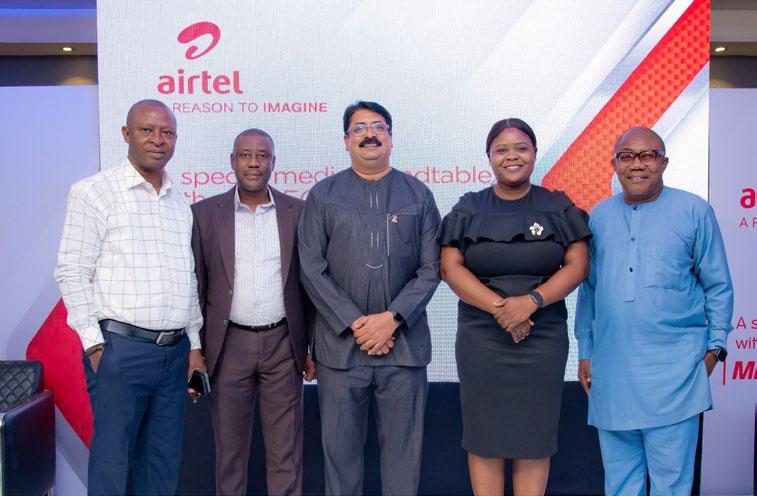

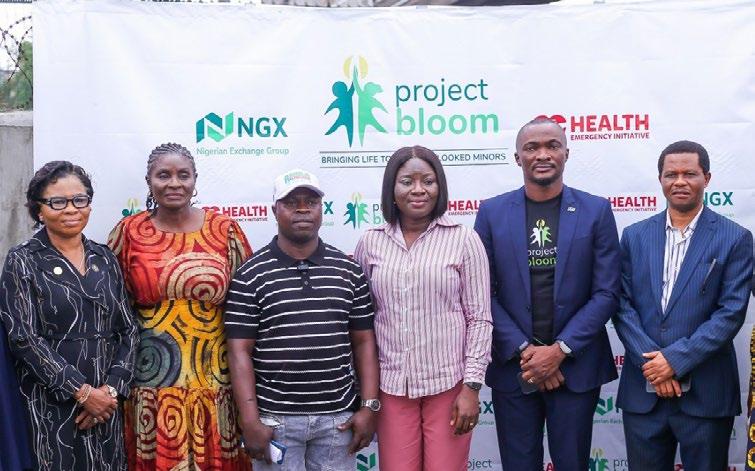
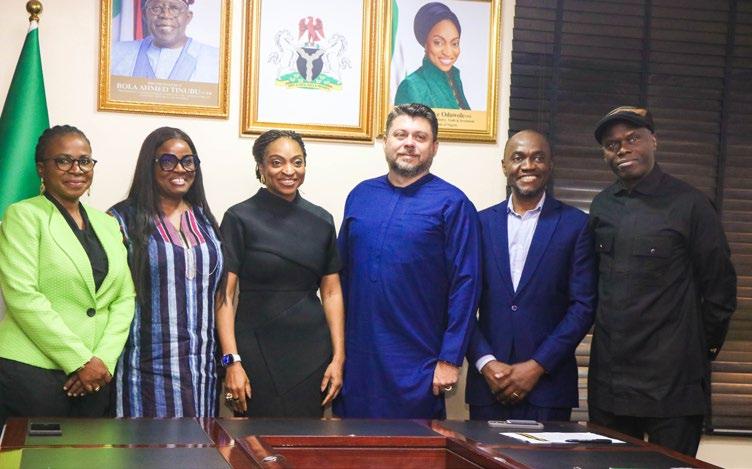

Director, Nursing Services, Lagos State Ministry of Health, Mrs. Shola Aketi; Permanent Secretary and CEO, Health Facilities Monitoring and Accreditation Agency (HEFAMAA), Dr. Abiola Idowu; Chief of Staff, Yaba LCDA, Honorable Oladimeji Saheed; Director, Medical Disease Control, Lagos State Health District IV, Dr Oludolapo Sotunde; Group Chief Finance, Investment & Strategy Officer, NGX Group, Mr. Adebayo Opatade; Executive Director, Health Emergency Initiative, Mr. Pascal Achunine, at the official flag-off of Project B.L.O.O.M., a child
initiative implemented by HEI in collaboration with NGX Group, held at Aiyetoro Primary Health Centre, Yaba, Lagos on August
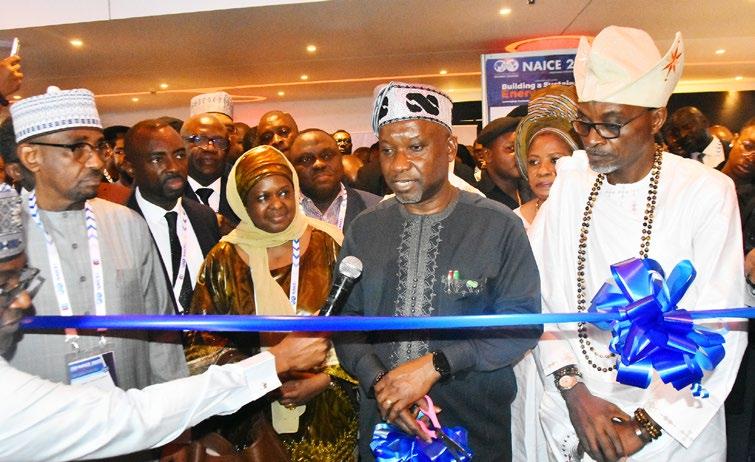



BY JUDE OBAFEMI
The Nigerian Athletics Championships, held between August 1 and 3, 2025 at the Yaba College of Technology Sports Complex in Lagos, served as a critical platform for Nigeria’s athletes to secure qualification for continental and international meets, such as the 2025 World Athletics Championships in Tokyo, scheduled for September 13 - 21. Athletes such as Tobi Amusan, Udodi Onwuzurike and Nnamdi Onwaeze delivered standout performances, highlighting Nigeria’s depth of talent. However, the event was overshadowed by the revisiting of Favour Ofili’s potential switch of allegiance to Turkey, raising concerns about the state of Nigerian athletics.

The championships opened with high expectations, particularly for Tobi Amusan, the world record holder in the women’s 100-metre hurdles. Amusan entered
with a season’s best of 11.18 seconds in the 100 metres, achieved in Kingston, Jamaica in June 2025. In Lagos, she competed in both the hurdles and the flat 100 metres, earning her fifth national hurdles title with a time of 12.57 seconds, ahead of Adaobi Tabugbo (13.03 seconds) and Faith Osamuyi (13.36 seconds).
In the 100 metres, Amusan ran 11.30 seconds in her semi-final and 11.28 seconds in the repechage but withdrew from the final, likely to focus on her primary event. Her performance solidified her role as Nigeria’s leading hurdles athlete, with her focus on ending the nation’s medal drought at the World Championships since her 2022 Oregon gold.
Udodi Onwuzurike, the 2021 World U20 Champion, competed in the men’s 200 metres, bringing a personal best of 20.50 seconds. He faced strong competition from Alaba Akintola, who led Nigerian men with a 20.23-second personal best, just 0.07 seconds short of the World Championships qualifying mark. Other contenders included Olaolu Olatunde (20.39 seconds) and Emmanuel James Taiwo (20.83 seconds).
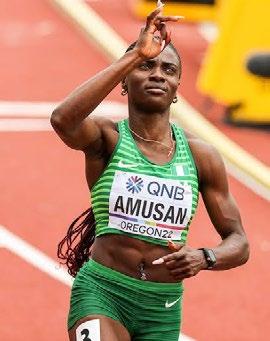
Nnamdi Onwaeze, a 2025 NCAA Division II All-American, emerged as a standout in the men’s 110-metre hurdles. Onwaeze won his first national title with a time of 14.13 seconds, defeating Wisdom Great Musa, who ran 14.19 seconds after a 13.73-second personal best in the semi-finals. Onwaeze’s victory followed a strong season, including a personal best of 13.63 seconds at the Al Brenda Track in Turlock, California, on May 23. He dedicated his emotional win to his late aunt, a key influence in his career, highlighting the growing impact
of diasporan athletes in Nigerian athletics.
The men’s 100 metres was a highlight, with Israel Okon claiming the title in 10.04 seconds (+2.3 m/s), edging out Alaba Akintola (10.05 seconds) and Adekalu Fakorede (10.07 seconds). Defending champion Kanyinsola Ajayi, who ran 9.92 seconds twice in 2025, withdrew due to a minor injury, allowing Okon’s breakthrough. Seye Ogunlewe, a three-time champion, finished fourth in 10.09 seconds, followed by Olaolu Olatunde (10.15 seconds), James Emmanuel (10.16 seconds) and Enoch Adegoke (10.20 seconds).
In the 400 metres event, Samuel Ogazi led with a personal best of 44.41 seconds from the NCAA Championships in Eugene. His 44.43-second run at the NCAA East Prelims signalled his potential to challenge Sunday Bada’s 1995 Nigerian all-comers record of 44.69 seconds. Ezekiel Nathaniel, known for his 400-metre hurdles, ran an African indoor record of 44.74 seconds in 2025, while Chidi Okezie (44.98 seconds), Gafar Badmus (45.65 seconds), and Ezekiel Asuquo (45.83 seconds) added competition. Badmus won the final in 45.71 seconds, followed by Asuquo (46.29 seconds) and David Akhalu (46.91 seconds).
Field events produced some more notable results. Charles Godfred defended his men’s long jump title with a 7.95-metre leap, while Prestina Ochonogor won her second consecutive women’s long jump title with 6.52 metres. Temitope Adeshina, who equalled her national high jump record of 1.97 metres, aimed for her fourth title. Chioma Onyekwere-Lyons defended her discus title with 60.74 metres, ahead of Obiageri Amaechi (59.39 metres), while Sade Olatoye retained her hammer throw title with 67.50 metres.
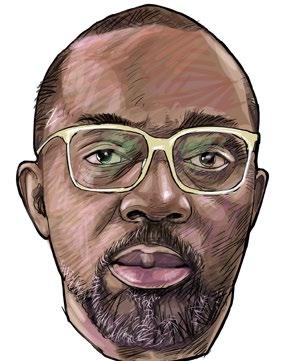
Therelease of critical examination and election results in Nigeria has repeatedly descended into chaos due to technical failures, undermining public confidence in key institutions.
The West African Examinations Council (WAEC), the Joint Admissions and Matriculation Board (JAMB) and the Independent National Electoral Commission (INEC) have faced significant disruptions in recent years, each marked by systemic issues that have delayed processes, cost candidates and voters time and money, and eroded trust.
The 2025 West African Senior School Certificate Examination (WASSCE) results, the 2025 Unified Tertiary Matriculation Examination (UTME) and the 2023 general election all suffered from technical glitches that exposed fragile infrastructure and inadequate planning.
Let us take a moment to examine these incidents, identify common patterns, evaluate their impact, and propose practical solutions to prevent future crises, drawing on credible sources to ensure accuracy and depth.
The West African Examinations Council announced on August 7 that it had suspended access to the 2025 WASSCE results for school candidates after discovering technical errors in Mathematics, English Language, Biology, and Economics.The issue stemmed from a new security measure called paper serialisation, intended to curb examination malpractice by assigning unique identifiers to question papers.
An internal review revealed that this system caused inaccuracies in result processing, prompting the council to take the result-checking portal offline for 24 hours to correct the errors.
The council issued a public apology, acknowledging the inconvenience to candidates and urging them to recheck their results after the fix. Only 38.32 per cent of the 1,969,313 candidates achieved credits in five subjects, including English and Mathematics, a 33.8 per cent drop from the previous year, with 192,089 results withheld due to suspected malpractice.
The Federal Ministry of Education later confirmed the resolution of the glitch, but the incident sparked widespread frustration among students and parents, many of whom faced delays in university admissions processes.
Similarly, the Joint Admissions and Matriculation Board encountered significant problems during the 2025 UTME. A server error, attributed to a faulty software patch, affected over 370,000 candidates across 157 examination centres, particularly in the South-East and Lagos regions.
The error led to blank screens, terminated sessions, and scrambled scores, forcing thousands of candidates to retake the examination.The board conducted a review and issued corrected results, but the disruption caused financial burdens for candidates who had to travel or pay for additional preparation.
The incident also delayed university admissions, as institutions awaited revised scores to finalise their processes. Public outcry highlighted the emotional toll on candidates, many of whom had prepared for months only to face uncertainty due to technical failures. One candidate, 19-year-old Timilehin Faith Opesusi, reportedly took her own life because of this issue.
The Independent National Electoral Commission faced parallel challenges during the 2023 general election. I wrote about this last year, following the controversies that ensued after the formal declaration of the result of the presidential election.
INEC’s Result Viewing (IReV) Portal, designed to upload polling unit results in real-time to ensure transparency, failed to function as planned during the presidential election.
A post-election report by the commission attributed the failure to a configuration
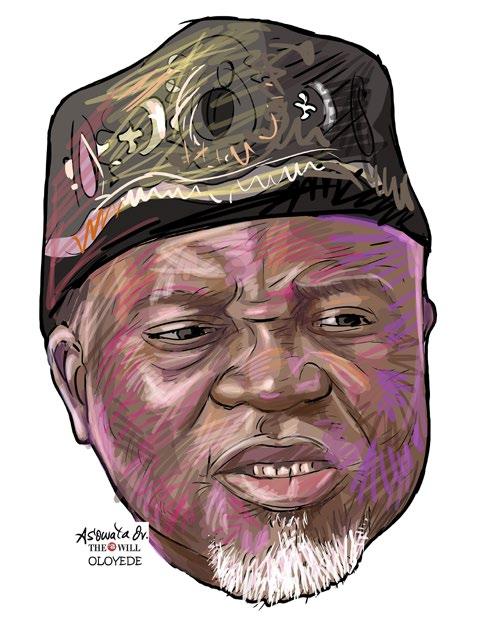
error that prevented timely uploads, leading to widespread allegations of electoral manipulation.
Observers, including the European Union, noted that the glitch significantly undermined public confidence in the electoral process, with many voters questioning the integrity of the results.The commission acknowledged the issue and promised improvements, but the fallout fuelled legal challenges and public protests, highlighting the stakes of reliable technology in democratic processes.
These incidents share striking similarities that point to deeper systemic problems. Each involved critical systems, WAEC’s result-checking portal, JAMB’s examination servers and INEC’s IReV platform, that failed under pressure due to inadequate preparation.
The introduction of new technology, such as WAEC’s paper serialisation or INEC’s IReV, was not accompanied by sufficient testing. In WAEC’s case, the serialisation system, though modelled on practices by other examination bodies, was not thoroughly vetted, leading to errors that could have been caught earlier.
JAMB’s server patch was applied without adequate pre-testing, a lapse that affected thousands of candidates. INEC’s failure to simulate peak loads on IReV left it vulnerable to collapse during a high-stakes election. Budget constraints also played a role: Nigeria’s inconsistent power supply and limited investment in modern infrastructure likely exacerbated server vulnerabilities across all three cases. Additionally, the lack of robust contingency plans meant that when systems failed, there were no immediate backups to mitigate the impact. For instance, WAEC had to shut down its entire portal, and JAMB required weeks to organise retakes, while INEC’s delays left voters without real-time access to results.
The consequences of these failures extend beyond immediate disruptions. For students,

the financial and emotional costs are significant. Apart from the gravity of the suicide case, other candidates affected by JAMB’s 2025 errors incurred expenses for travel, accommodation and additional tutoring, particularly burdensome for low-income families. WAEC’s glitch delayed admissions, with some students missing university application deadlines.
Parents and students without smartphone data spent money on transport and online time at cybercafés, only to find the portal inaccessible.
The broader economic impact is also notable: Retakes and reviews strain institutional budgets, with JAMB and WAEC spending millions to address their errors. In the electoral sphere, INEC’s IReV failure contributed to costly legal battles and a loss of public trust, with surveys indicating declining confidence in the commission post-2023.
These incidents disproportionately affect marginalised groups, such as rural candidates with limited access to technology or voters in remote areas reliant on manual processes, highlighting equity concerns.
The erosion of trust is perhaps the most enduring impact. When institutions responsible for critical civic functions, education and elections, fail repeatedly, public faith in governance weakens.
The 2023 election controversy led to accusations of deliberate sabotage, despite INEC’s claim of technical errors. Similarly, WAEC and JAMB faced criticism for rushing result releases without proper checks, fuelling perceptions of incompetence.The cumulative effect is a growing scepticism about Nigeria’s ability to manage high-stakes processes, which could deter participation in future examinations or elections.
Addressing these recurring failures requires practical, evidence-based reforms. First, independent audits of technological systems must be mandated before deployment. External experts could have identified vulnerabilities in WAEC’s serialisation or JAMB’s server patch, preventing widespread disruption.The Commonwealth Observer Group’s report on Nigeria’s 2023 election recommended such audits for electoral technology, a model applicable to examination bodies.
Second, transparency in vendor contracts is essential.The public deserves clarity on which companies supply these systems and whether they face penalties for failures. Reports suggest JAMB’s server issues stemmed from a third-party provider, yet no accountability measures were disclosed.
Third, pre-release stress tests simulating peak usage, such as thousands of simultaneous result checks or uploads, should be standard operating procedure when deploying these systems.
Finally, investing in modern infrastructure, such as cloud-based backups and stable power systems, could reduce reliance on outdated servers.The Federal Ministry of Education’s plan to introduce computer-based testing for WAEC and NECO by 2026 is a step forward, but only if accompanied by robust testing and training.
These reforms are not merely technical fixes but steps toward restoring public confidence. Nigeria’s young population depends on reliable examinations for educational and career opportunities, just as its democracy hinges on transparent elections.
The 2025 WASSCE glitch, JAMB’s server errors, and INEC’s IReV failure are not isolated incidents but symptoms of a broader neglect of infrastructure and planning.
By learning from these crises, Nigeria can build systems that deliver results on time, fairly, and transparently.The cost of inaction is clear: further delays, financial losses, and a deepening distrust that could undermine the nation’s educational and democratic foundations. With accountability and investment, these institutions can regain credibility, ensuring that students and voters alike are no longer left waiting for systems to catch up.